
Code of Business Conduct Xerox Code of Business Conduct
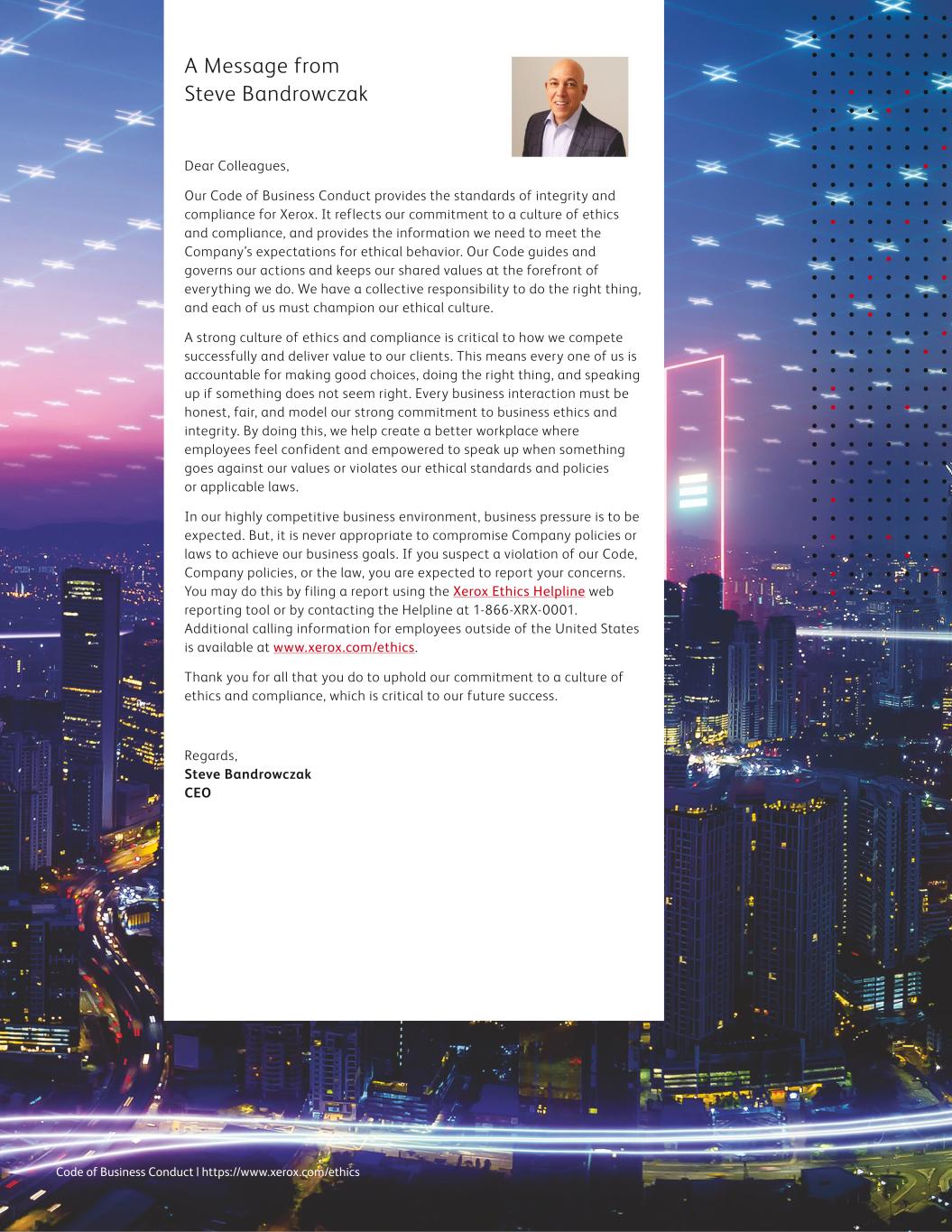
Code of Business Conduct | https://www.xerox.com/ethics A Message from Steve Bandrowczak Dear Colleagues, Our Code of Business Conduct provides the standards of integrity and compliance for Xerox. It reflects our commitment to a culture of ethics and compliance, and provides the information we need to meet the Company’s expectations for ethical behavior. Our Code guides and governs our actions and keeps our shared values at the forefront of everything we do. We have a collective responsibility to do the right thing, and each of us must champion our ethical culture. A strong culture of ethics and compliance is critical to how we compete successfully and deliver value to our clients. This means every one of us is accountable for making good choices, doing the right thing, and speaking up if something does not seem right. Every business interaction must be honest, fair, and model our strong commitment to business ethics and integrity. By doing this, we help create a better workplace where employees feel confident and empowered to speak up when something goes against our values or violates our ethical standards and policies or applicable laws. In our highly competitive business environment, business pressure is to be expected. But, it is never appropriate to compromise Company policies or laws to achieve our business goals. If you suspect a violation of our Code, Company policies, or the law, you are expected to report your concerns. You may do this by filing a report using the Xerox Ethics Helpline web reporting tool or by contacting the Helpline at 1-866-XRX-0001. Additional calling information for employees outside of the United States is available at www.xerox.com/ethics. Thank you for all that you do to uphold our commitment to a culture of ethics and compliance, which is critical to our future success. Regards, Steve Bandrowczak CEO
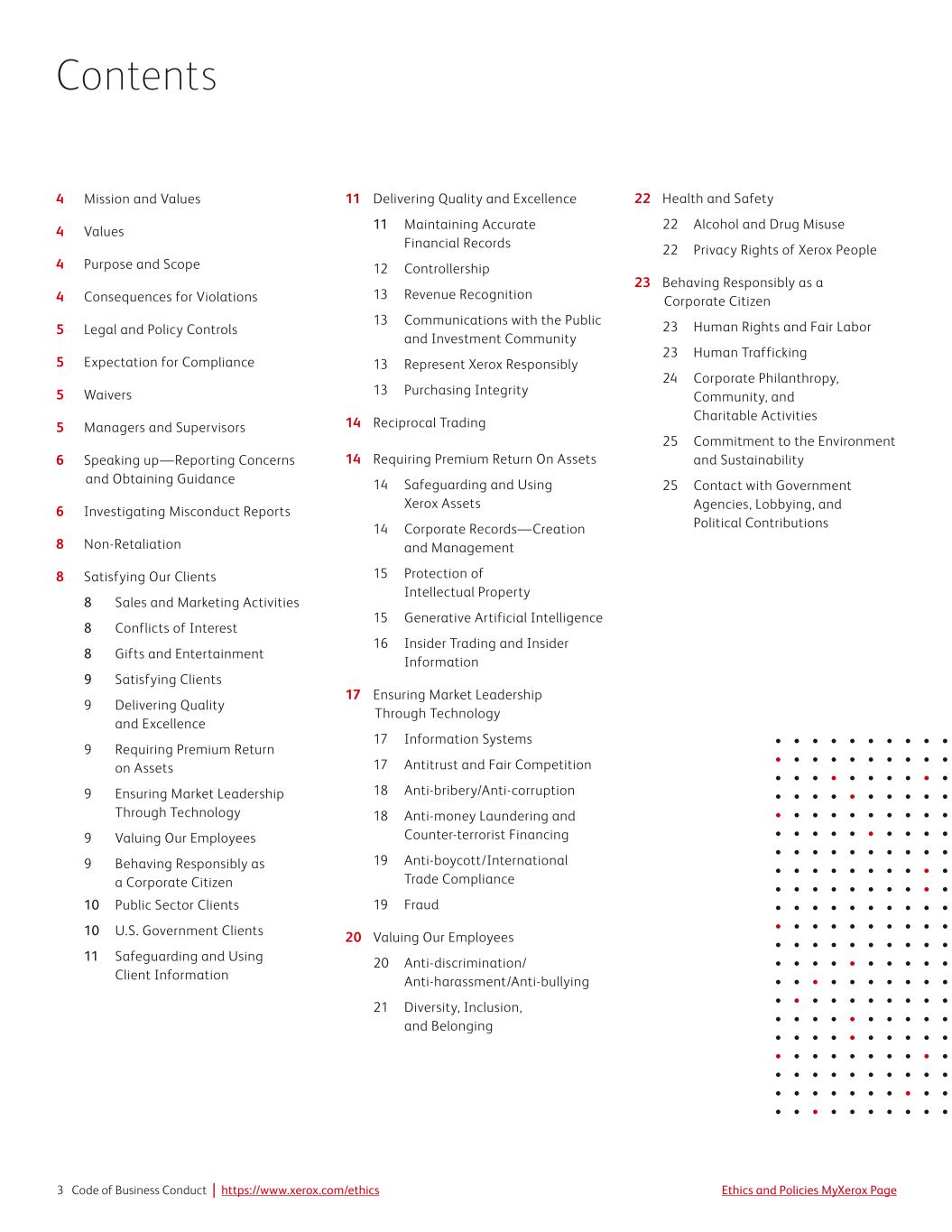
Contents 4 Mission and Values 4 Values 4 Purpose and Scope 4 Consequences for Violations 5 Legal and Policy Controls 5 Expectation for Compliance 5 Waivers 5 Managers and Supervisors 6 Speaking up—Reporting Concerns and Obtaining Guidance 6 Investigating Misconduct Reports 8 Non-Retaliation 8 Satisfying Our Clients 8 Sales and Marketing Activities 8 Conflicts of Interest 8 Gifts and Entertainment 9 Satisfying Clients 9 Delivering Quality and Excellence 9 Requiring Premium Return on Assets 9 Ensuring Market Leadership Through Technology 9 Valuing Our Employees 9 Behaving Responsibly as a Corporate Citizen 10 Public Sector Clients 10 U.S. Government Clients 11 Safeguarding and Using Client Information 11 Delivering Quality and Excellence 11 Maintaining Accurate Financial Records 12 Controllership 13 Revenue Recognition 13 Communications with the Public and Investment Community 13 Represent Xerox Responsibly 13 Purchasing Integrity 14 Reciprocal Trading 14 Requiring Premium Return On Assets 14 Safeguarding and Using Xerox Assets 14 Corporate Records—Creation and Management 15 Protection of Intellectual Property 15 Generative Artificial Intelligence 16 Insider Trading and Insider Information 17 Ensuring Market Leadership Through Technology 17 Information Systems 17 Antitrust and Fair Competition 18 Anti-bribery/Anti-corruption 18 Anti-money Laundering and Counter-terrorist Financing 19 Anti-boycott/International Trade Compliance 19 Fraud 20 Valuing Our Employees 20 Anti-discrimination/ Anti-harassment/Anti-bullying 21 Diversity, Inclusion, and Belonging 22 Health and Safety 22 Alcohol and Drug Misuse 22 Privacy Rights of Xerox People 23 Behaving Responsibly as a Corporate Citizen 23 Human Rights and Fair Labor 23 Human Trafficking 24 Corporate Philanthropy, Community, and Charitable Activities 25 Commitment to the Environment and Sustainability 25 Contact with Government Agencies, Lobbying, and Political Contributions 3 Code of Business Conduct | https://www.xerox.com/ethics Ethics and Policies MyXerox Page
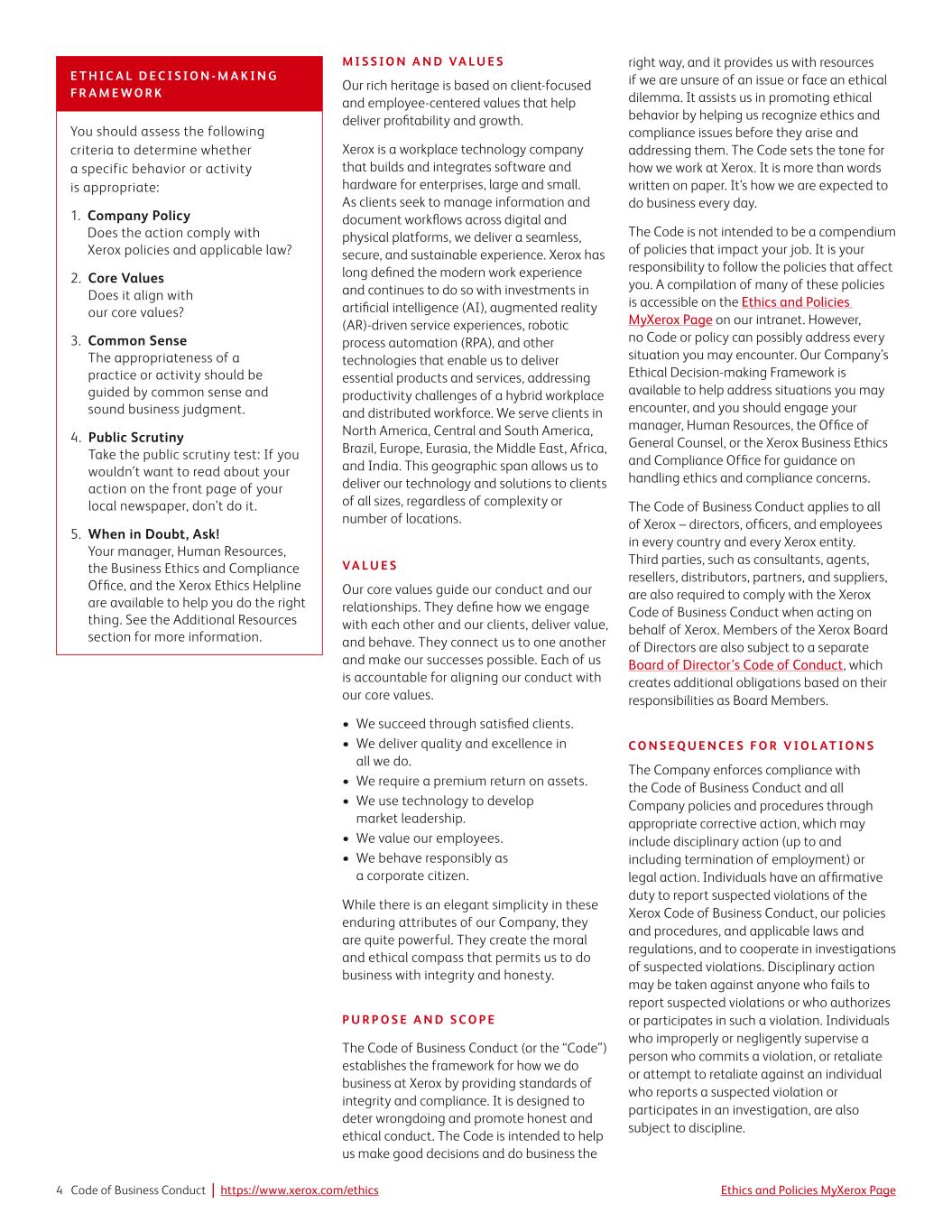
right way, and it provides us with resources if we are unsure of an issue or face an ethical dilemma. It assists us in promoting ethical behavior by helping us recognize ethics and compliance issues before they arise and addressing them. The Code sets the tone for how we work at Xerox. It is more than words written on paper. It’s how we are expected to do business every day. The Code is not intended to be a compendium of policies that impact your job. It is your responsibility to follow the policies that affect you. A compilation of many of these policies is accessible on the Ethics and Policies MyXerox Page on our intranet. However, no Code or policy can possibly address every situation you may encounter. Our Company’s Ethical Decision-making Framework is available to help address situations you may encounter, and you should engage your manager, Human Resources, the Office of General Counsel, or the Xerox Business Ethics and Compliance Office for guidance on handling ethics and compliance concerns. The Code of Business Conduct applies to all of Xerox – directors, officers, and employees in every country and every Xerox entity. Third parties, such as consultants, agents, resellers, distributors, partners, and suppliers, are also required to comply with the Xerox Code of Business Conduct when acting on behalf of Xerox. Members of the Xerox Board of Directors are also subject to a separate Board of Director’s Code of Conduct, which creates additional obligations based on their responsibilities as Board Members. C O N S E Q U E N C E S F O R V I O L AT I O N S The Company enforces compliance with the Code of Business Conduct and all Company policies and procedures through appropriate corrective action, which may include disciplinary action (up to and including termination of employment) or legal action. Individuals have an affirmative duty to report suspected violations of the Xerox Code of Business Conduct, our policies and procedures, and applicable laws and regulations, and to cooperate in investigations of suspected violations. Disciplinary action may be taken against anyone who fails to report suspected violations or who authorizes or participates in such a violation. Individuals who improperly or negligently supervise a person who commits a violation, or retaliate or attempt to retaliate against an individual who reports a suspected violation or participates in an investigation, are also subject to discipline. M I S S I O N A N D VA L U E S Our rich heritage is based on client-focused and employee-centered values that help deliver profitability and growth. Xerox is a workplace technology company that builds and integrates software and hardware for enterprises, large and small. As clients seek to manage information and document workflows across digital and physical platforms, we deliver a seamless, secure, and sustainable experience. Xerox has long defined the modern work experience and continues to do so with investments in artificial intelligence (AI), augmented reality (AR)-driven service experiences, robotic process automation (RPA), and other technologies that enable us to deliver essential products and services, addressing productivity challenges of a hybrid workplace and distributed workforce. We serve clients in North America, Central and South America, Brazil, Europe, Eurasia, the Middle East, Africa, and India. This geographic span allows us to deliver our technology and solutions to clients of all sizes, regardless of complexity or number of locations. VA L U E S Our core values guide our conduct and our relationships. They define how we engage with each other and our clients, deliver value, and behave. They connect us to one another and make our successes possible. Each of us is accountable for aligning our conduct with our core values. • We succeed through satisfied clients. • We deliver quality and excellence in all we do. • We require a premium return on assets. • We use technology to develop market leadership. • We value our employees. • We behave responsibly as a corporate citizen. While there is an elegant simplicity in these enduring attributes of our Company, they are quite powerful. They create the moral and ethical compass that permits us to do business with integrity and honesty. P U R P O S E A N D S C O P E The Code of Business Conduct (or the “Code”) establishes the framework for how we do business at Xerox by providing standards of integrity and compliance. It is designed to deter wrongdoing and promote honest and ethical conduct. The Code is intended to help us make good decisions and do business the E T H I C A L D E C I S I O N - M A K I N G F R A M E W O R K You should assess the following criteria to determine whether a specific behavior or activity is appropriate: 1. Company Policy Does the action comply with Xerox policies and applicable law? 2. Core Values Does it align with our core values? 3. Common Sense The appropriateness of a practice or activity should be guided by common sense and sound business judgment. 4. Public Scrutiny Take the public scrutiny test: If you wouldn’t want to read about your action on the front page of your local newspaper, don’t do it. 5. When in Doubt, Ask! Your manager, Human Resources, the Business Ethics and Compliance Office, and the Xerox Ethics Helpline are available to help you do the right thing. See the Additional Resources section for more information. 4 Code of Business Conduct | https://www.xerox.com/ethics Ethics and Policies MyXerox Page
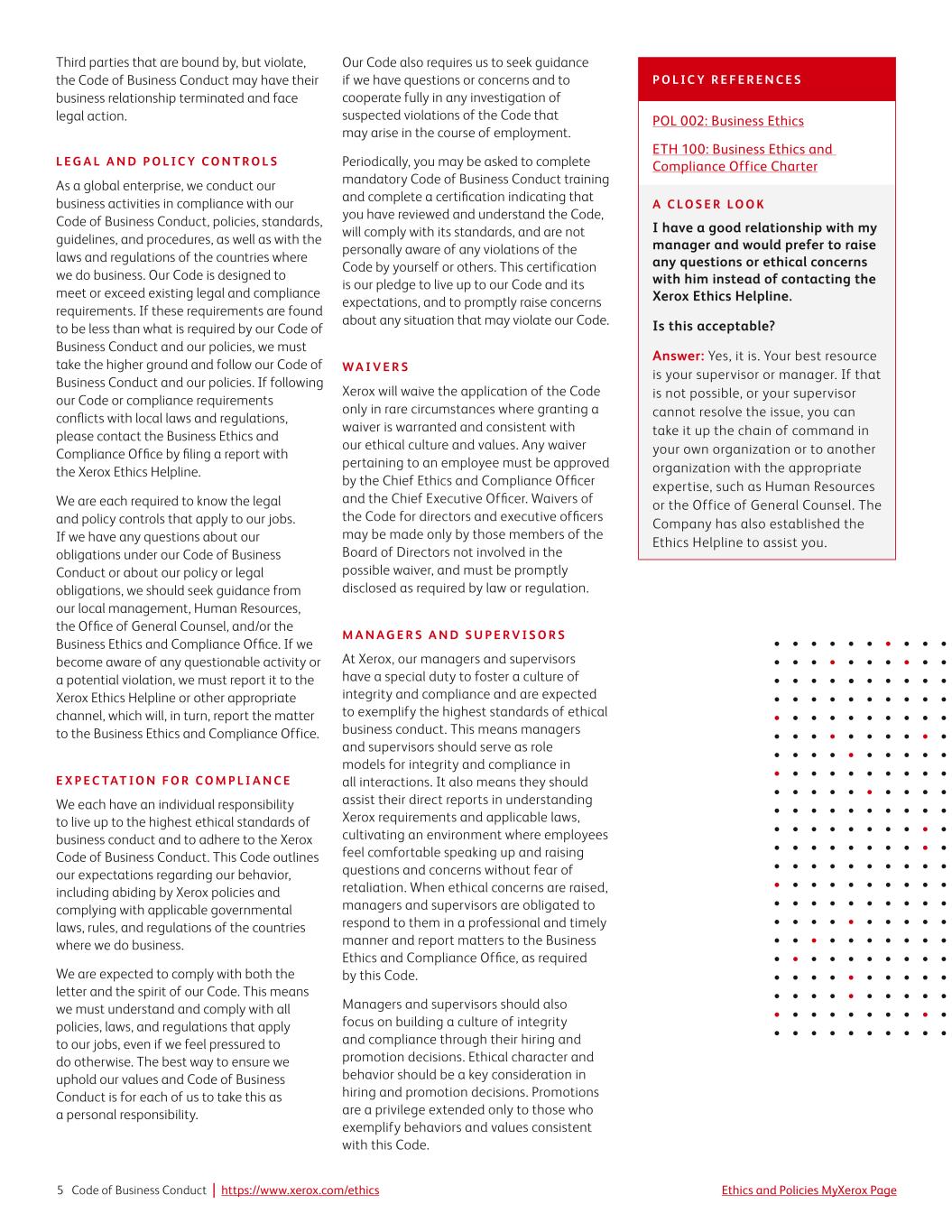
Third parties that are bound by, but violate, the Code of Business Conduct may have their business relationship terminated and face legal action. L E G A L A N D P O L I C Y C O N T R O L S As a global enterprise, we conduct our business activities in compliance with our Code of Business Conduct, policies, standards, guidelines, and procedures, as well as with the laws and regulations of the countries where we do business. Our Code is designed to meet or exceed existing legal and compliance requirements. If these requirements are found to be less than what is required by our Code of Business Conduct and our policies, we must take the higher ground and follow our Code of Business Conduct and our policies. If following our Code or compliance requirements conflicts with local laws and regulations, please contact the Business Ethics and Compliance Office by filing a report with the Xerox Ethics Helpline. We are each required to know the legal and policy controls that apply to our jobs. If we have any questions about our obligations under our Code of Business Conduct or about our policy or legal obligations, we should seek guidance from our local management, Human Resources, the Office of General Counsel, and/or the Business Ethics and Compliance Office. If we become aware of any questionable activity or a potential violation, we must report it to the Xerox Ethics Helpline or other appropriate channel, which will, in turn, report the matter to the Business Ethics and Compliance Office. E X P E C TAT I O N F O R C O M P L I A N C E We each have an individual responsibility to live up to the highest ethical standards of business conduct and to adhere to the Xerox Code of Business Conduct. This Code outlines our expectations regarding our behavior, including abiding by Xerox policies and complying with applicable governmental laws, rules, and regulations of the countries where we do business. We are expected to comply with both the letter and the spirit of our Code. This means we must understand and comply with all policies, laws, and regulations that apply to our jobs, even if we feel pressured to do otherwise. The best way to ensure we uphold our values and Code of Business Conduct is for each of us to take this as a personal responsibility. Our Code also requires us to seek guidance if we have questions or concerns and to cooperate fully in any investigation of suspected violations of the Code that may arise in the course of employment. Periodically, you may be asked to complete mandatory Code of Business Conduct training and complete a certification indicating that you have reviewed and understand the Code, will comply with its standards, and are not personally aware of any violations of the Code by yourself or others. This certification is our pledge to live up to our Code and its expectations, and to promptly raise concerns about any situation that may violate our Code. W A I V E R S Xerox will waive the application of the Code only in rare circumstances where granting a waiver is warranted and consistent with our ethical culture and values. Any waiver pertaining to an employee must be approved by the Chief Ethics and Compliance Officer and the Chief Executive Officer. Waivers of the Code for directors and executive officers may be made only by those members of the Board of Directors not involved in the possible waiver, and must be promptly disclosed as required by law or regulation. M A N A G E R S A N D S U P E R V I S O R S At Xerox, our managers and supervisors have a special duty to foster a culture of integrity and compliance and are expected to exemplify the highest standards of ethical business conduct. This means managers and supervisors should serve as role models for integrity and compliance in all interactions. It also means they should assist their direct reports in understanding Xerox requirements and applicable laws, cultivating an environment where employees feel comfortable speaking up and raising questions and concerns without fear of retaliation. When ethical concerns are raised, managers and supervisors are obligated to respond to them in a professional and timely manner and report matters to the Business Ethics and Compliance Office, as required by this Code. Managers and supervisors should also focus on building a culture of integrity and compliance through their hiring and promotion decisions. Ethical character and behavior should be a key consideration in hiring and promotion decisions. Promotions are a privilege extended only to those who exemplify behaviors and values consistent with this Code. P O L I C Y R E F E R E N C E S POL 002: Business Ethics ETH 100: Business Ethics and Compliance Office Charter A C L O S E R L O O K I have a good relationship with my manager and would prefer to raise any questions or ethical concerns with him instead of contacting the Xerox Ethics Helpline. Is this acceptable? Answer: Yes, it is. Your best resource is your supervisor or manager. If that is not possible, or your supervisor cannot resolve the issue, you can take it up the chain of command in your own organization or to another organization with the appropriate expertise, such as Human Resources or the Office of General Counsel. The Company has also established the Ethics Helpline to assist you. 5 Code of Business Conduct | https://www.xerox.com/ethics Ethics and Policies MyXerox Page
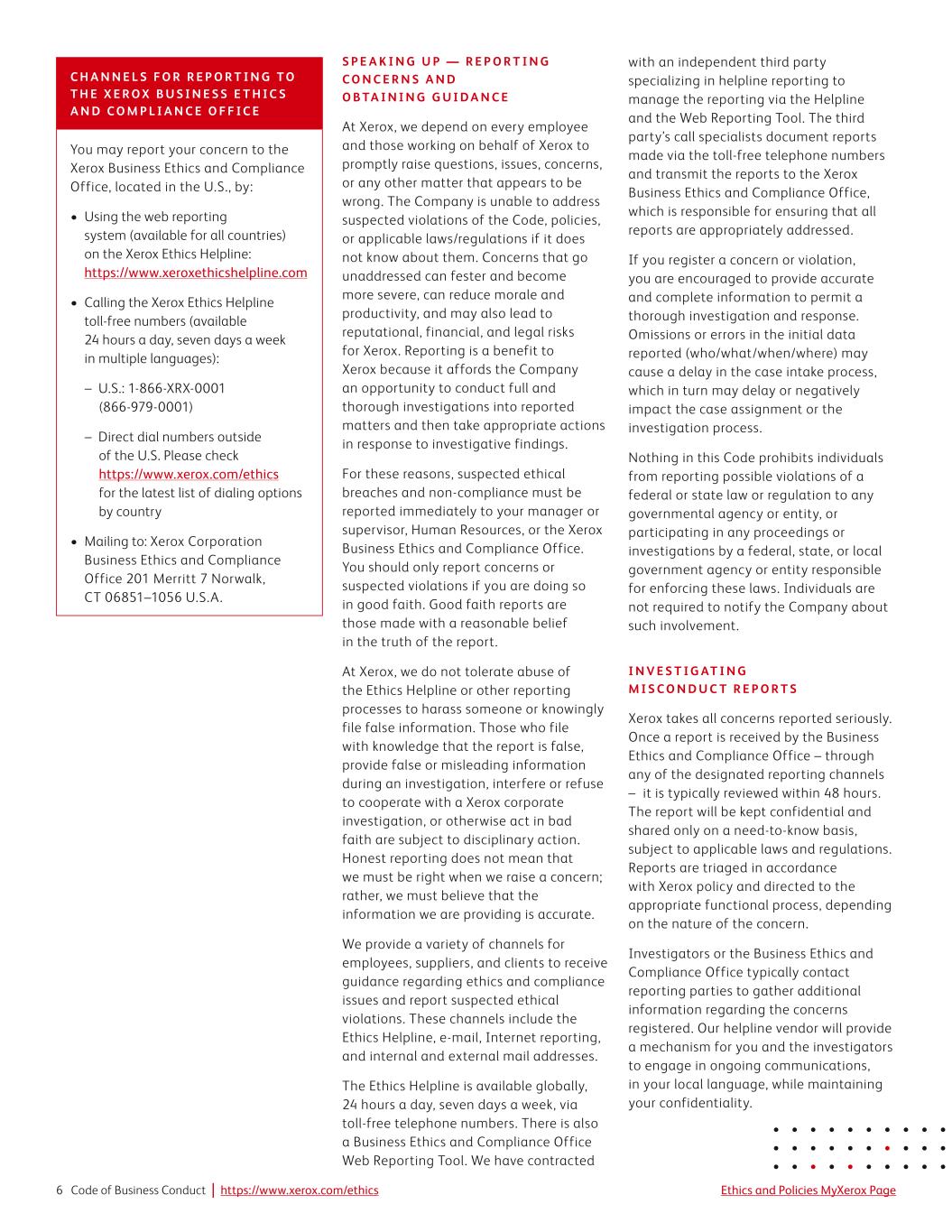
S P E A K I N G U P — R E P O R T I N G C O N C E R N S A N D O B TA I N I N G G U I D A N C E At Xerox, we depend on every employee and those working on behalf of Xerox to promptly raise questions, issues, concerns, or any other matter that appears to be wrong. The Company is unable to address suspected violations of the Code, policies, or applicable laws/regulations if it does not know about them. Concerns that go unaddressed can fester and become more severe, can reduce morale and productivity, and may also lead to reputational, financial, and legal risks for Xerox. Reporting is a benefit to Xerox because it affords the Company an opportunity to conduct full and thorough investigations into reported matters and then take appropriate actions in response to investigative findings. For these reasons, suspected ethical breaches and non-compliance must be reported immediately to your manager or supervisor, Human Resources, or the Xerox Business Ethics and Compliance Office. You should only report concerns or suspected violations if you are doing so in good faith. Good faith reports are those made with a reasonable belief in the truth of the report. At Xerox, we do not tolerate abuse of the Ethics Helpline or other reporting processes to harass someone or knowingly file false information. Those who file with knowledge that the report is false, provide false or misleading information during an investigation, interfere or refuse to cooperate with a Xerox corporate investigation, or otherwise act in bad faith are subject to disciplinary action. Honest reporting does not mean that we must be right when we raise a concern; rather, we must believe that the information we are providing is accurate. We provide a variety of channels for employees, suppliers, and clients to receive guidance regarding ethics and compliance issues and report suspected ethical violations. These channels include the Ethics Helpline, e-mail, Internet reporting, and internal and external mail addresses. The Ethics Helpline is available globally, 24 hours a day, seven days a week, via toll-free telephone numbers. There is also a Business Ethics and Compliance Office Web Reporting Tool. We have contracted with an independent third party specializing in helpline reporting to manage the reporting via the Helpline and the Web Reporting Tool. The third party’s call specialists document reports made via the toll-free telephone numbers and transmit the reports to the Xerox Business Ethics and Compliance Office, which is responsible for ensuring that all reports are appropriately addressed. If you register a concern or violation, you are encouraged to provide accurate and complete information to permit a thorough investigation and response. Omissions or errors in the initial data reported (who/what/when/where) may cause a delay in the case intake process, which in turn may delay or negatively impact the case assignment or the investigation process. Nothing in this Code prohibits individuals from reporting possible violations of a federal or state law or regulation to any governmental agency or entity, or participating in any proceedings or investigations by a federal, state, or local government agency or entity responsible for enforcing these laws. Individuals are not required to notify the Company about such involvement. I N V E S T I G AT I N G M I S C O N D U C T R E P O R T S Xerox takes all concerns reported seriously. Once a report is received by the Business Ethics and Compliance Office – through any of the designated reporting channels – it is typically reviewed within 48 hours. The report will be kept confidential and shared only on a need-to-know basis, subject to applicable laws and regulations. Reports are triaged in accordance with Xerox policy and directed to the appropriate functional process, depending on the nature of the concern. Investigators or the Business Ethics and Compliance Office typically contact reporting parties to gather additional information regarding the concerns registered. Our helpline vendor will provide a mechanism for you and the investigators to engage in ongoing communications, in your local language, while maintaining your confidentiality. C H A N N E L S F O R R E P O R T I N G T O T H E X E R O X B U S I N E S S E T H I C S A N D C O M P L I A N C E O F F I C E You may report your concern to the Xerox Business Ethics and Compliance Office, located in the U.S., by: • Using the web reporting system (available for all countries) on the Xerox Ethics Helpline: https://www.xeroxethicshelpline.com • Calling the Xerox Ethics Helpline toll-free numbers (available 24 hours a day, seven days a week in multiple languages): – U.S.: 1-866-XRX-0001 (866-979-0001) – Direct dial numbers outside of the U.S. Please check https://www.xerox.com/ethics for the latest list of dialing options by country • Mailing to: Xerox Corporation Business Ethics and Compliance Office 201 Merritt 7 Norwalk, CT 06851–1056 U.S.A. 6 Code of Business Conduct | https://www.xerox.com/ethics Ethics and Policies MyXerox Page
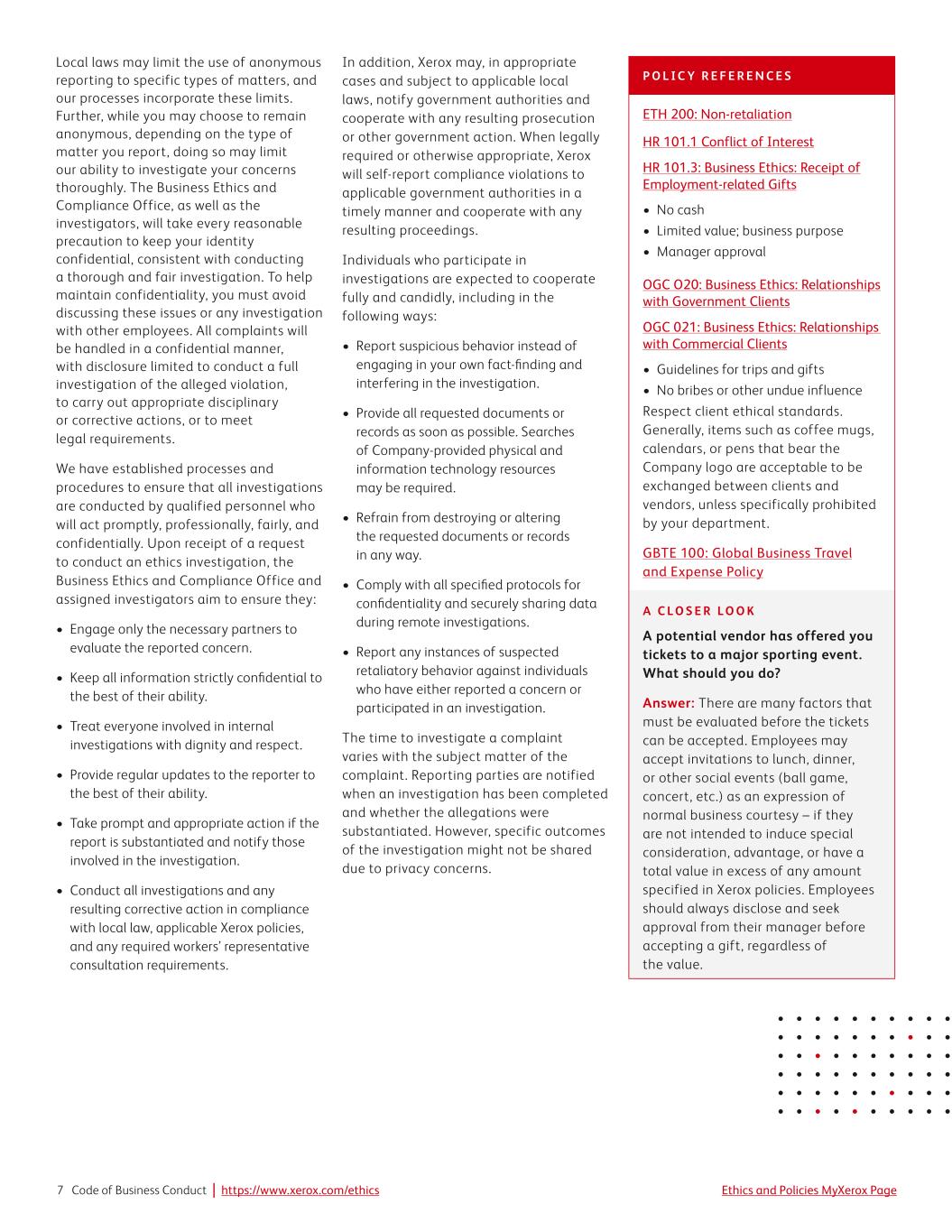
Local laws may limit the use of anonymous reporting to specific types of matters, and our processes incorporate these limits. Further, while you may choose to remain anonymous, depending on the type of matter you report, doing so may limit our ability to investigate your concerns thoroughly. The Business Ethics and Compliance Office, as well as the investigators, will take every reasonable precaution to keep your identity confidential, consistent with conducting a thorough and fair investigation. To help maintain confidentiality, you must avoid discussing these issues or any investigation with other employees. All complaints will be handled in a confidential manner, with disclosure limited to conduct a full investigation of the alleged violation, to carry out appropriate disciplinary or corrective actions, or to meet legal requirements. We have established processes and procedures to ensure that all investigations are conducted by qualified personnel who will act promptly, professionally, fairly, and confidentially. Upon receipt of a request to conduct an ethics investigation, the Business Ethics and Compliance Office and assigned investigators aim to ensure they: • Engage only the necessary partners to evaluate the reported concern. • Keep all information strictly confidential to the best of their ability. • Treat everyone involved in internal investigations with dignity and respect. • Provide regular updates to the reporter to the best of their ability. • Take prompt and appropriate action if the report is substantiated and notify those involved in the investigation. • Conduct all investigations and any resulting corrective action in compliance with local law, applicable Xerox policies, and any required workers’ representative consultation requirements. In addition, Xerox may, in appropriate cases and subject to applicable local laws, notify government authorities and cooperate with any resulting prosecution or other government action. When legally required or otherwise appropriate, Xerox will self-report compliance violations to applicable government authorities in a timely manner and cooperate with any resulting proceedings. Individuals who participate in investigations are expected to cooperate fully and candidly, including in the following ways: • Report suspicious behavior instead of engaging in your own fact-finding and interfering in the investigation. • Provide all requested documents or records as soon as possible. Searches of Company-provided physical and information technology resources may be required. • Refrain from destroying or altering the requested documents or records in any way. • Comply with all specified protocols for confidentiality and securely sharing data during remote investigations. • Report any instances of suspected retaliatory behavior against individuals who have either reported a concern or participated in an investigation. The time to investigate a complaint varies with the subject matter of the complaint. Reporting parties are notified when an investigation has been completed and whether the allegations were substantiated. However, specific outcomes of the investigation might not be shared due to privacy concerns. P O L I C Y R E F E R E N C E S ETH 200: Non-retaliation HR 101.1 Conflict of Interest HR 101.3: Business Ethics: Receipt of Employment-related Gifts • No cash • Limited value; business purpose • Manager approval OGC O20: Business Ethics: Relationships with Government Clients OGC 021: Business Ethics: Relationships with Commercial Clients • Guidelines for trips and gifts • No bribes or other undue influence Respect client ethical standards. Generally, items such as coffee mugs, calendars, or pens that bear the Company logo are acceptable to be exchanged between clients and vendors, unless specifically prohibited by your department. GBTE 100: Global Business Travel and Expense Policy A C L O S E R L O O K A potential vendor has offered you tickets to a major sporting event. What should you do? Answer: There are many factors that must be evaluated before the tickets can be accepted. Employees may accept invitations to lunch, dinner, or other social events (ball game, concert, etc.) as an expression of normal business courtesy – if they are not intended to induce special consideration, advantage, or have a total value in excess of any amount specified in Xerox policies. Employees should always disclose and seek approval from their manager before accepting a gift, regardless of the value. 7 Code of Business Conduct | https://www.xerox.com/ethics Ethics and Policies MyXerox Page
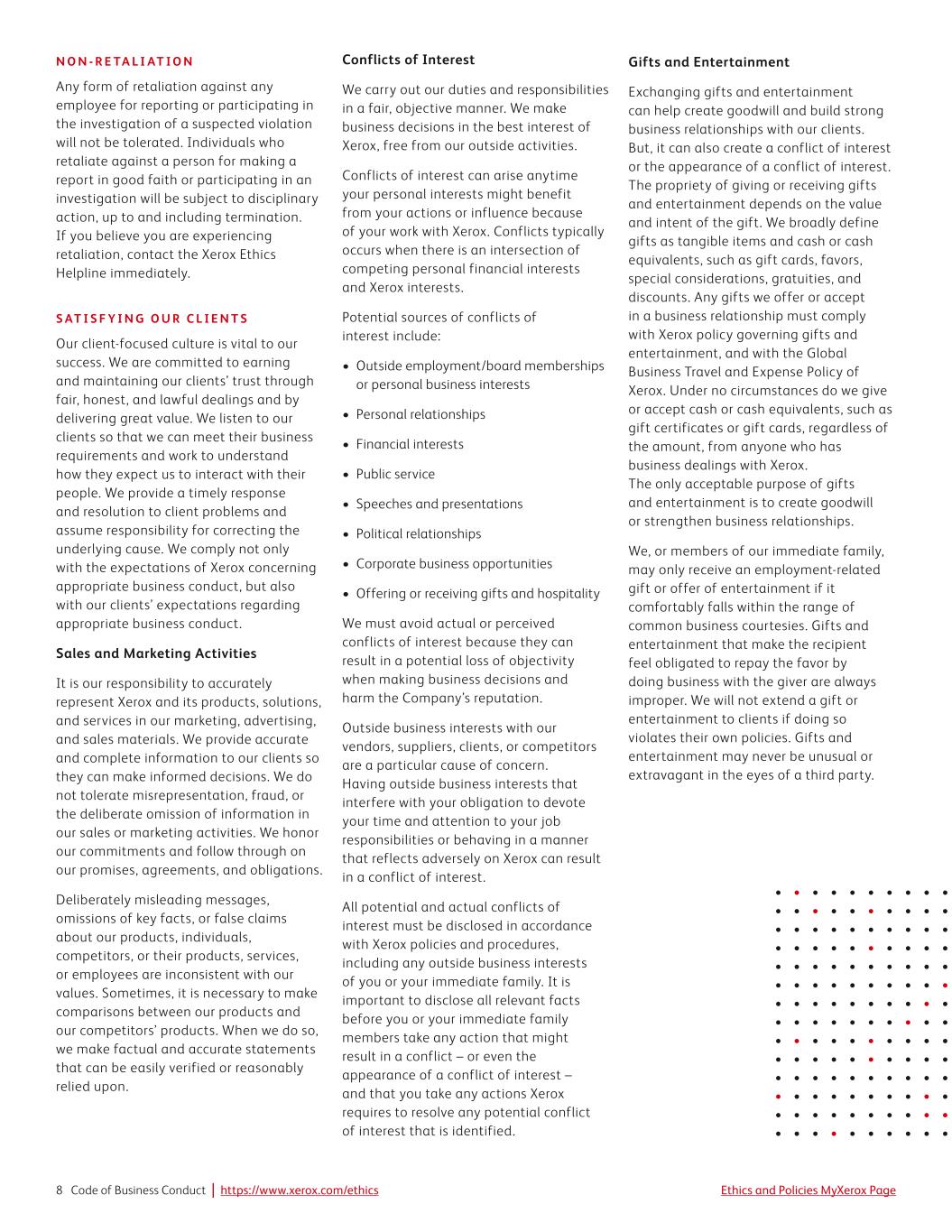
Conflicts of Interest We carry out our duties and responsibilities in a fair, objective manner. We make business decisions in the best interest of Xerox, free from our outside activities. Conflicts of interest can arise anytime your personal interests might benefit from your actions or influence because of your work with Xerox. Conflicts typically occurs when there is an intersection of competing personal financial interests and Xerox interests. Potential sources of conflicts of interest include: • Outside employment/board memberships or personal business interests • Personal relationships • Financial interests • Public service • Speeches and presentations • Political relationships • Corporate business opportunities • Offering or receiving gifts and hospitality We must avoid actual or perceived conflicts of interest because they can result in a potential loss of objectivity when making business decisions and harm the Company’s reputation. Outside business interests with our vendors, suppliers, clients, or competitors are a particular cause of concern. Having outside business interests that interfere with your obligation to devote your time and attention to your job responsibilities or behaving in a manner that reflects adversely on Xerox can result in a conflict of interest. All potential and actual conflicts of interest must be disclosed in accordance with Xerox policies and procedures, including any outside business interests of you or your immediate family. It is important to disclose all relevant facts before you or your immediate family members take any action that might result in a conflict – or even the appearance of a conflict of interest – and that you take any actions Xerox requires to resolve any potential conflict of interest that is identified. Gifts and Entertainment Exchanging gifts and entertainment can help create goodwill and build strong business relationships with our clients. But, it can also create a conflict of interest or the appearance of a conflict of interest. The propriety of giving or receiving gifts and entertainment depends on the value and intent of the gift. We broadly define gifts as tangible items and cash or cash equivalents, such as gift cards, favors, special considerations, gratuities, and discounts. Any gifts we offer or accept in a business relationship must comply with Xerox policy governing gifts and entertainment, and with the Global Business Travel and Expense Policy of Xerox. Under no circumstances do we give or accept cash or cash equivalents, such as gift certificates or gift cards, regardless of the amount, from anyone who has business dealings with Xerox. The only acceptable purpose of gifts and entertainment is to create goodwill or strengthen business relationships. We, or members of our immediate family, may only receive an employment-related gift or offer of entertainment if it comfortably falls within the range of common business courtesies. Gifts and entertainment that make the recipient feel obligated to repay the favor by doing business with the giver are always improper. We will not extend a gift or entertainment to clients if doing so violates their own policies. Gifts and entertainment may never be unusual or extravagant in the eyes of a third party. N O N - R E TA L I AT I O N Any form of retaliation against any employee for reporting or participating in the investigation of a suspected violation will not be tolerated. Individuals who retaliate against a person for making a report in good faith or participating in an investigation will be subject to disciplinary action, up to and including termination. If you believe you are experiencing retaliation, contact the Xerox Ethics Helpline immediately. S AT I S F Y I N G O U R C L I E N T S Our client-focused culture is vital to our success. We are committed to earning and maintaining our clients’ trust through fair, honest, and lawful dealings and by delivering great value. We listen to our clients so that we can meet their business requirements and work to understand how they expect us to interact with their people. We provide a timely response and resolution to client problems and assume responsibility for correcting the underlying cause. We comply not only with the expectations of Xerox concerning appropriate business conduct, but also with our clients’ expectations regarding appropriate business conduct. Sales and Marketing Activities It is our responsibility to accurately represent Xerox and its products, solutions, and services in our marketing, advertising, and sales materials. We provide accurate and complete information to our clients so they can make informed decisions. We do not tolerate misrepresentation, fraud, or the deliberate omission of information in our sales or marketing activities. We honor our commitments and follow through on our promises, agreements, and obligations. Deliberately misleading messages, omissions of key facts, or false claims about our products, individuals, competitors, or their products, services, or employees are inconsistent with our values. Sometimes, it is necessary to make comparisons between our products and our competitors’ products. When we do so, we make factual and accurate statements that can be easily verified or reasonably relied upon. 8 Code of Business Conduct | https://www.xerox.com/ethics Ethics and Policies MyXerox Page
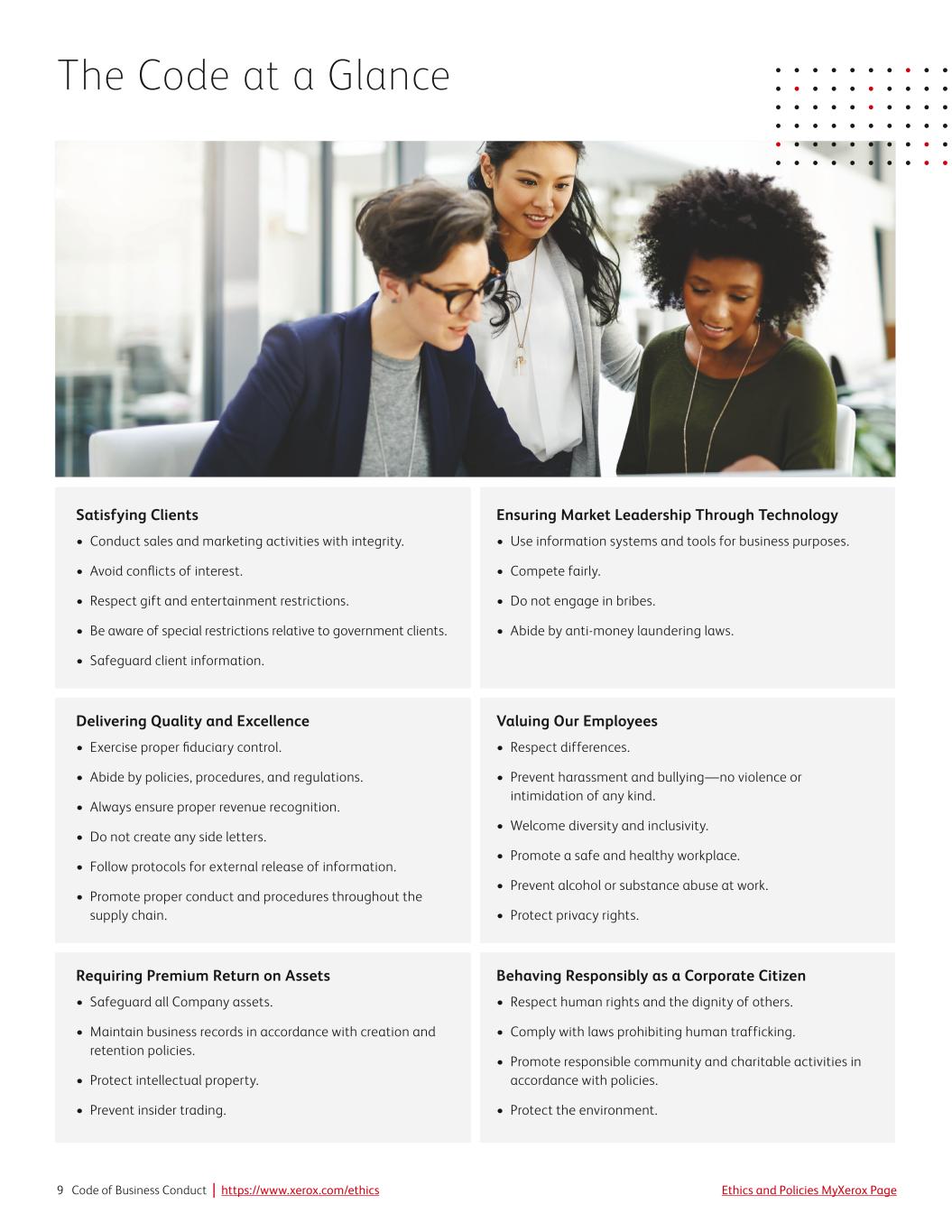
The Code at a Glance Satisfying Clients • Conduct sales and marketing activities with integrity. • Avoid conflicts of interest. • Respect gift and entertainment restrictions. • Be aware of special restrictions relative to government clients. • Safeguard client information. Ensuring Market Leadership Through Technology • Use information systems and tools for business purposes. • Compete fairly. • Do not engage in bribes. • Abide by anti-money laundering laws. Delivering Quality and Excellence • Exercise proper fiduciary control. • Abide by policies, procedures, and regulations. • Always ensure proper revenue recognition. • Do not create any side letters. • Follow protocols for external release of information. • Promote proper conduct and procedures throughout the supply chain. Valuing Our Employees • Respect differences. • Prevent harassment and bullying—no violence or intimidation of any kind. • Welcome diversity and inclusivity. • Promote a safe and healthy workplace. • Prevent alcohol or substance abuse at work. • Protect privacy rights. Requiring Premium Return on Assets • Safeguard all Company assets. • Maintain business records in accordance with creation and retention policies. • Protect intellectual property. • Prevent insider trading. Behaving Responsibly as a Corporate Citizen • Respect human rights and the dignity of others. • Comply with laws prohibiting human trafficking. • Promote responsible community and charitable activities in accordance with policies. • Protect the environment. 9 Code of Business Conduct | https://www.xerox.com/ethics Ethics and Policies MyXerox Page
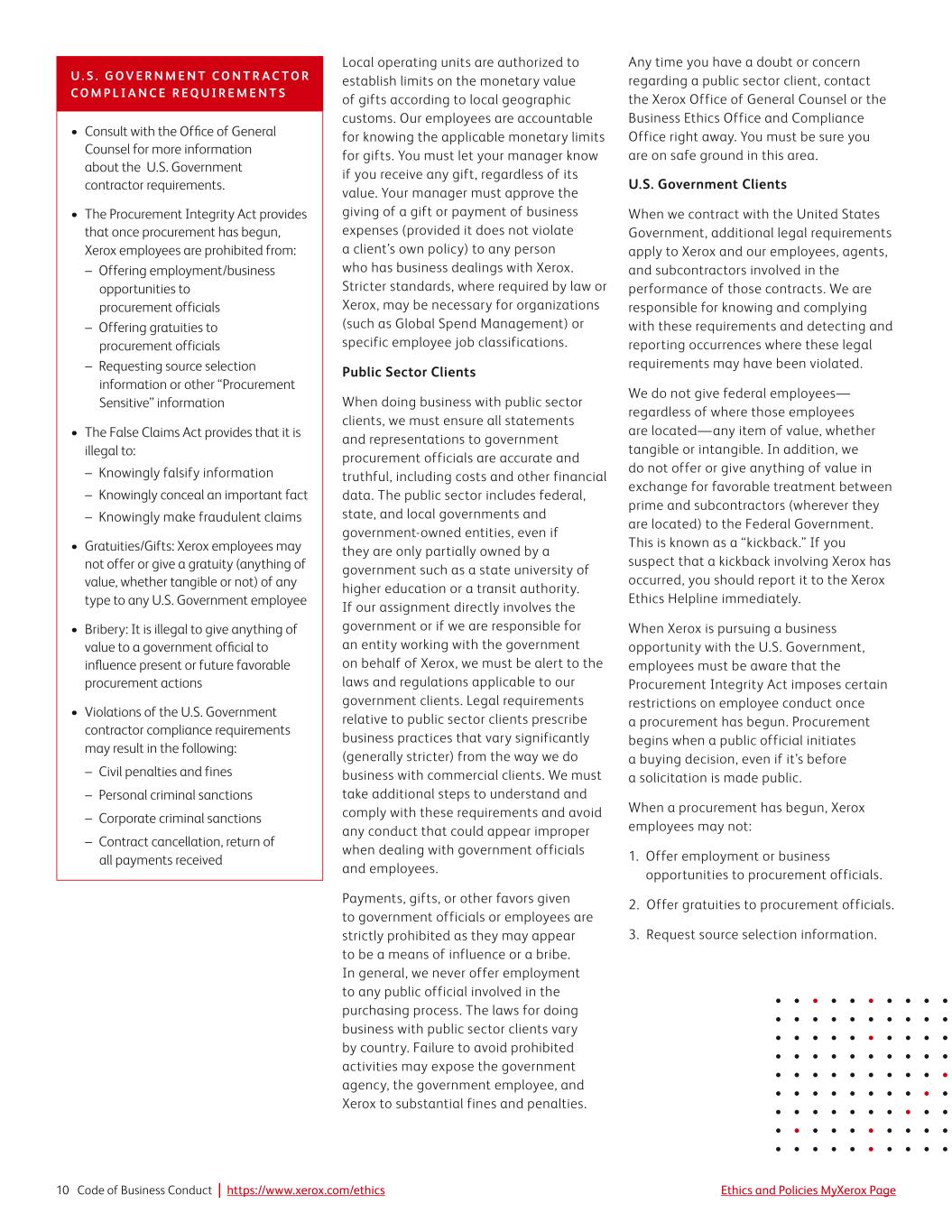
Local operating units are authorized to establish limits on the monetary value of gifts according to local geographic customs. Our employees are accountable for knowing the applicable monetary limits for gifts. You must let your manager know if you receive any gift, regardless of its value. Your manager must approve the giving of a gift or payment of business expenses (provided it does not violate a client’s own policy) to any person who has business dealings with Xerox. Stricter standards, where required by law or Xerox, may be necessary for organizations (such as Global Spend Management) or specific employee job classifications. Public Sector Clients When doing business with public sector clients, we must ensure all statements and representations to government procurement officials are accurate and truthful, including costs and other financial data. The public sector includes federal, state, and local governments and government-owned entities, even if they are only partially owned by a government such as a state university of higher education or a transit authority. If our assignment directly involves the government or if we are responsible for an entity working with the government on behalf of Xerox, we must be alert to the laws and regulations applicable to our government clients. Legal requirements relative to public sector clients prescribe business practices that vary significantly (generally stricter) from the way we do business with commercial clients. We must take additional steps to understand and comply with these requirements and avoid any conduct that could appear improper when dealing with government officials and employees. Payments, gifts, or other favors given to government officials or employees are strictly prohibited as they may appear to be a means of influence or a bribe. In general, we never offer employment to any public official involved in the purchasing process. The laws for doing business with public sector clients vary by country. Failure to avoid prohibited activities may expose the government agency, the government employee, and Xerox to substantial fines and penalties. Any time you have a doubt or concern regarding a public sector client, contact the Xerox Office of General Counsel or the Business Ethics Office and Compliance Office right away. You must be sure you are on safe ground in this area. U.S. Government Clients When we contract with the United States Government, additional legal requirements apply to Xerox and our employees, agents, and subcontractors involved in the performance of those contracts. We are responsible for knowing and complying with these requirements and detecting and reporting occurrences where these legal requirements may have been violated. We do not give federal employees— regardless of where those employees are located—any item of value, whether tangible or intangible. In addition, we do not offer or give anything of value in exchange for favorable treatment between prime and subcontractors (wherever they are located) to the Federal Government. This is known as a “kickback.” If you suspect that a kickback involving Xerox has occurred, you should report it to the Xerox Ethics Helpline immediately. When Xerox is pursuing a business opportunity with the U.S. Government, employees must be aware that the Procurement Integrity Act imposes certain restrictions on employee conduct once a procurement has begun. Procurement begins when a public official initiates a buying decision, even if it’s before a solicitation is made public. When a procurement has begun, Xerox employees may not: 1. Offer employment or business opportunities to procurement officials. 2. Offer gratuities to procurement officials. 3. Request source selection information. U . S . G O V E R N M E N T C O N T R A C T O R C O M P L I A N C E R E Q U I R E M E N T S • Consult with the Office of General Counsel for more information about the U.S. Government contractor requirements. • The Procurement Integrity Act provides that once procurement has begun, Xerox employees are prohibited from: – Offering employment/business opportunities to procurement officials – Offering gratuities to procurement officials – Requesting source selection information or other “Procurement Sensitive” information • The False Claims Act provides that it is illegal to: – Knowingly falsify information – Knowingly conceal an important fact – Knowingly make fraudulent claims • Gratuities/Gifts: Xerox employees may not offer or give a gratuity (anything of value, whether tangible or not) of any type to any U.S. Government employee • Bribery: It is illegal to give anything of value to a government official to influence present or future favorable procurement actions • Violations of the U.S. Government contractor compliance requirements may result in the following: – Civil penalties and fines – Personal criminal sanctions – Corporate criminal sanctions – Contract cancellation, return of all payments received 10 Code of Business Conduct | https://www.xerox.com/ethics Ethics and Policies MyXerox Page
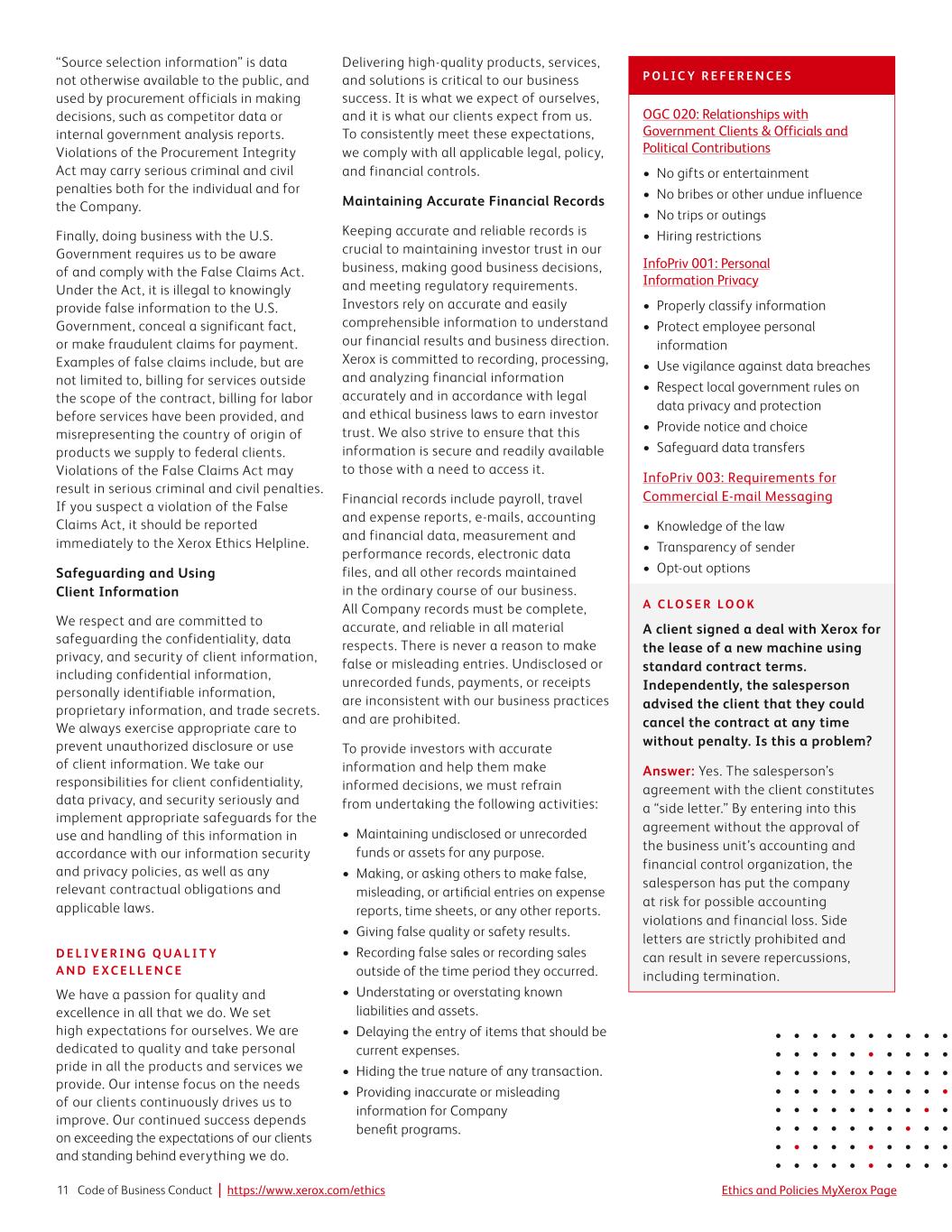
“Source selection information” is data not otherwise available to the public, and used by procurement officials in making decisions, such as competitor data or internal government analysis reports. Violations of the Procurement Integrity Act may carry serious criminal and civil penalties both for the individual and for the Company. Finally, doing business with the U.S. Government requires us to be aware of and comply with the False Claims Act. Under the Act, it is illegal to knowingly provide false information to the U.S. Government, conceal a significant fact, or make fraudulent claims for payment. Examples of false claims include, but are not limited to, billing for services outside the scope of the contract, billing for labor before services have been provided, and misrepresenting the country of origin of products we supply to federal clients. Violations of the False Claims Act may result in serious criminal and civil penalties. If you suspect a violation of the False Claims Act, it should be reported immediately to the Xerox Ethics Helpline. Safeguarding and Using Client Information We respect and are committed to safeguarding the confidentiality, data privacy, and security of client information, including confidential information, personally identifiable information, proprietary information, and trade secrets. We always exercise appropriate care to prevent unauthorized disclosure or use of client information. We take our responsibilities for client confidentiality, data privacy, and security seriously and implement appropriate safeguards for the use and handling of this information in accordance with our information security and privacy policies, as well as any relevant contractual obligations and applicable laws. D E L I V E R I N G Q U A L I T Y A N D E X C E L L E N C E We have a passion for quality and excellence in all that we do. We set high expectations for ourselves. We are dedicated to quality and take personal pride in all the products and services we provide. Our intense focus on the needs of our clients continuously drives us to improve. Our continued success depends on exceeding the expectations of our clients and standing behind everything we do. Delivering high-quality products, services, and solutions is critical to our business success. It is what we expect of ourselves, and it is what our clients expect from us. To consistently meet these expectations, we comply with all applicable legal, policy, and financial controls. Maintaining Accurate Financial Records Keeping accurate and reliable records is crucial to maintaining investor trust in our business, making good business decisions, and meeting regulatory requirements. Investors rely on accurate and easily comprehensible information to understand our financial results and business direction. Xerox is committed to recording, processing, and analyzing financial information accurately and in accordance with legal and ethical business laws to earn investor trust. We also strive to ensure that this information is secure and readily available to those with a need to access it. Financial records include payroll, travel and expense reports, e-mails, accounting and financial data, measurement and performance records, electronic data files, and all other records maintained in the ordinary course of our business. All Company records must be complete, accurate, and reliable in all material respects. There is never a reason to make false or misleading entries. Undisclosed or unrecorded funds, payments, or receipts are inconsistent with our business practices and are prohibited. To provide investors with accurate information and help them make informed decisions, we must refrain from undertaking the following activities: • Maintaining undisclosed or unrecorded funds or assets for any purpose. • Making, or asking others to make false, misleading, or artificial entries on expense reports, time sheets, or any other reports. • Giving false quality or safety results. • Recording false sales or recording sales outside of the time period they occurred. • Understating or overstating known liabilities and assets. • Delaying the entry of items that should be current expenses. • Hiding the true nature of any transaction. • Providing inaccurate or misleading information for Company benefit programs. P O L I C Y R E F E R E N C E S OGC 020: Relationships with Government Clients & Officials and Political Contributions • No gifts or entertainment • No bribes or other undue influence • No trips or outings • Hiring restrictions InfoPriv 001: Personal Information Privacy • Properly classify information • Protect employee personal information • Use vigilance against data breaches • Respect local government rules on data privacy and protection • Provide notice and choice • Safeguard data transfers InfoPriv 003: Requirements for Commercial E-mail Messaging • Knowledge of the law • Transparency of sender • Opt-out options A C L O S E R L O O K A client signed a deal with Xerox for the lease of a new machine using standard contract terms. Independently, the salesperson advised the client that they could cancel the contract at any time without penalty. Is this a problem? Answer: Yes. The salesperson’s agreement with the client constitutes a “side letter.” By entering into this agreement without the approval of the business unit’s accounting and financial control organization, the salesperson has put the company at risk for possible accounting violations and financial loss. Side letters are strictly prohibited and can result in severe repercussions, including termination. 11 Code of Business Conduct | https://www.xerox.com/ethics Ethics and Policies MyXerox Page
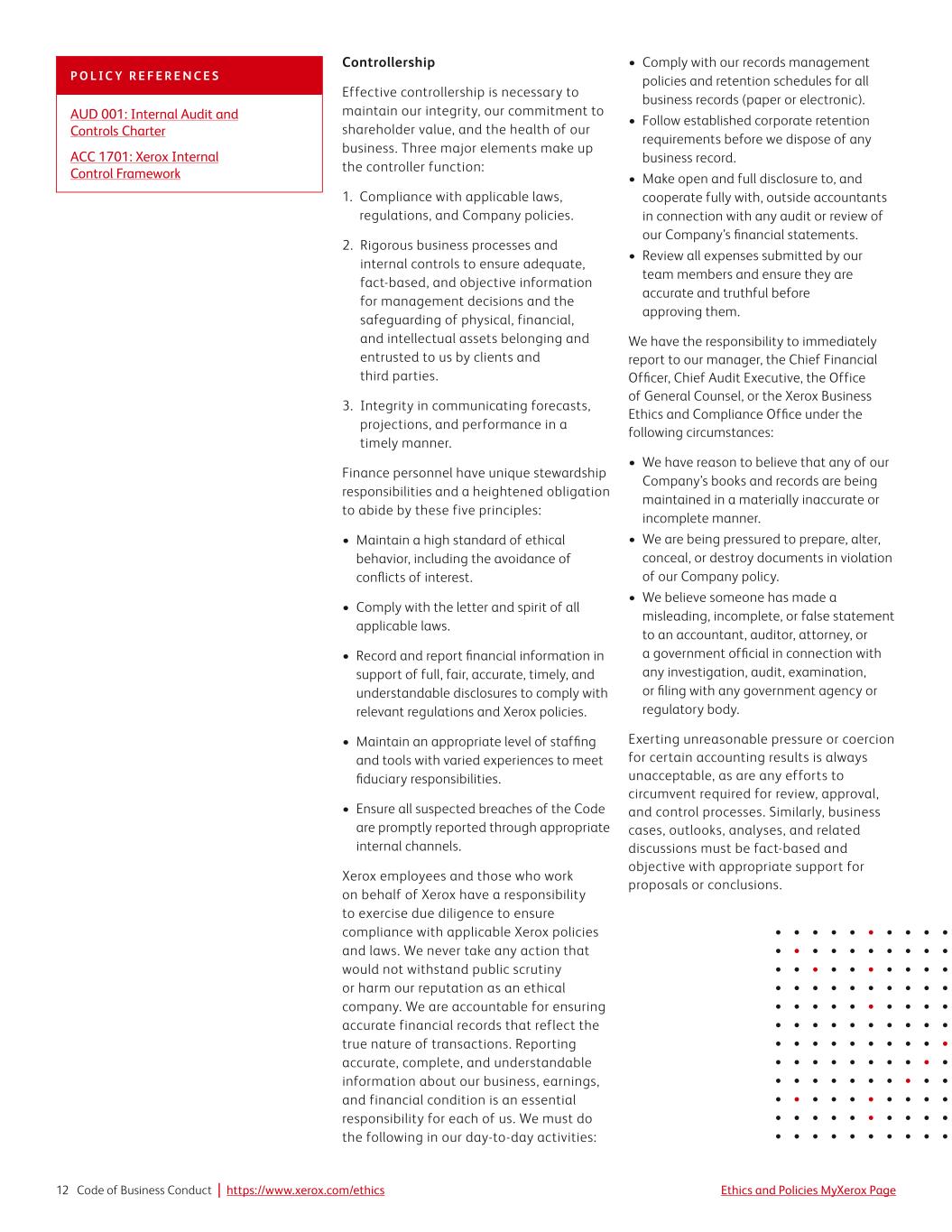
• Comply with our records management policies and retention schedules for all business records (paper or electronic). • Follow established corporate retention requirements before we dispose of any business record. • Make open and full disclosure to, and cooperate fully with, outside accountants in connection with any audit or review of our Company’s financial statements. • Review all expenses submitted by our team members and ensure they are accurate and truthful before approving them. We have the responsibility to immediately report to our manager, the Chief Financial Officer, Chief Audit Executive, the Office of General Counsel, or the Xerox Business Ethics and Compliance Office under the following circumstances: • We have reason to believe that any of our Company’s books and records are being maintained in a materially inaccurate or incomplete manner. • We are being pressured to prepare, alter, conceal, or destroy documents in violation of our Company policy. • We believe someone has made a misleading, incomplete, or false statement to an accountant, auditor, attorney, or a government official in connection with any investigation, audit, examination, or filing with any government agency or regulatory body. Exerting unreasonable pressure or coercion for certain accounting results is always unacceptable, as are any efforts to circumvent required for review, approval, and control processes. Similarly, business cases, outlooks, analyses, and related discussions must be fact-based and objective with appropriate support for proposals or conclusions. Controllership Effective controllership is necessary to maintain our integrity, our commitment to shareholder value, and the health of our business. Three major elements make up the controller function: 1. Compliance with applicable laws, regulations, and Company policies. 2. Rigorous business processes and internal controls to ensure adequate, fact-based, and objective information for management decisions and the safeguarding of physical, financial, and intellectual assets belonging and entrusted to us by clients and third parties. 3. Integrity in communicating forecasts, projections, and performance in a timely manner. Finance personnel have unique stewardship responsibilities and a heightened obligation to abide by these five principles: • Maintain a high standard of ethical behavior, including the avoidance of conflicts of interest. • Comply with the letter and spirit of all applicable laws. • Record and report financial information in support of full, fair, accurate, timely, and understandable disclosures to comply with relevant regulations and Xerox policies. • Maintain an appropriate level of staffing and tools with varied experiences to meet fiduciary responsibilities. • Ensure all suspected breaches of the Code are promptly reported through appropriate internal channels. Xerox employees and those who work on behalf of Xerox have a responsibility to exercise due diligence to ensure compliance with applicable Xerox policies and laws. We never take any action that would not withstand public scrutiny or harm our reputation as an ethical company. We are accountable for ensuring accurate financial records that reflect the true nature of transactions. Reporting accurate, complete, and understandable information about our business, earnings, and financial condition is an essential responsibility for each of us. We must do the following in our day-to-day activities: 12 Code of Business Conduct | https://www.xerox.com/ethics Ethics and Policies MyXerox Page P O L I C Y R E F E R E N C E S AUD 001: Internal Audit and Controls Charter ACC 1701: Xerox Internal Control Framework
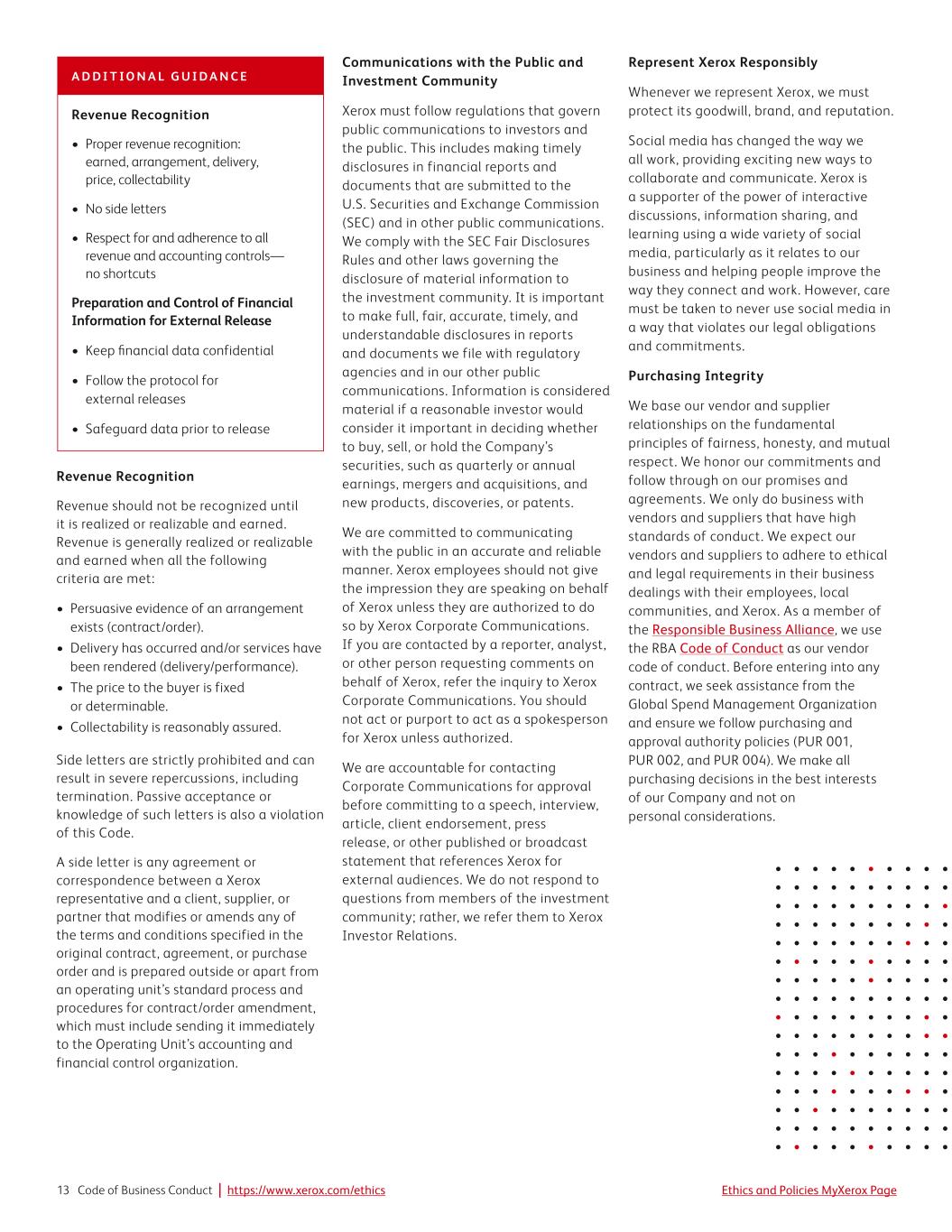
Revenue Recognition Revenue should not be recognized until it is realized or realizable and earned. Revenue is generally realized or realizable and earned when all the following criteria are met: • Persuasive evidence of an arrangement exists (contract/order). • Delivery has occurred and/or services have been rendered (delivery/performance). • The price to the buyer is fixed or determinable. • Collectability is reasonably assured. Side letters are strictly prohibited and can result in severe repercussions, including termination. Passive acceptance or knowledge of such letters is also a violation of this Code. A side letter is any agreement or correspondence between a Xerox representative and a client, supplier, or partner that modifies or amends any of the terms and conditions specified in the original contract, agreement, or purchase order and is prepared outside or apart from an operating unit’s standard process and procedures for contract/order amendment, which must include sending it immediately to the Operating Unit’s accounting and financial control organization. Communications with the Public and Investment Community Xerox must follow regulations that govern public communications to investors and the public. This includes making timely disclosures in financial reports and documents that are submitted to the U.S. Securities and Exchange Commission (SEC) and in other public communications. We comply with the SEC Fair Disclosures Rules and other laws governing the disclosure of material information to the investment community. It is important to make full, fair, accurate, timely, and understandable disclosures in reports and documents we file with regulatory agencies and in our other public communications. Information is considered material if a reasonable investor would consider it important in deciding whether to buy, sell, or hold the Company’s securities, such as quarterly or annual earnings, mergers and acquisitions, and new products, discoveries, or patents. We are committed to communicating with the public in an accurate and reliable manner. Xerox employees should not give the impression they are speaking on behalf of Xerox unless they are authorized to do so by Xerox Corporate Communications. If you are contacted by a reporter, analyst, or other person requesting comments on behalf of Xerox, refer the inquiry to Xerox Corporate Communications. You should not act or purport to act as a spokesperson for Xerox unless authorized. We are accountable for contacting Corporate Communications for approval before committing to a speech, interview, article, client endorsement, press release, or other published or broadcast statement that references Xerox for external audiences. We do not respond to questions from members of the investment community; rather, we refer them to Xerox Investor Relations. 13 Code of Business Conduct | https://www.xerox.com/ethics Ethics and Policies MyXerox Page A D D I T I O N A L G U I D A N C E Revenue Recognition • Proper revenue recognition: earned, arrangement, delivery, price, collectability • No side letters • Respect for and adherence to all revenue and accounting controls— no shortcuts Preparation and Control of Financial Information for External Release • Keep financial data confidential • Follow the protocol for external releases • Safeguard data prior to release Represent Xerox Responsibly Whenever we represent Xerox, we must protect its goodwill, brand, and reputation. Social media has changed the way we all work, providing exciting new ways to collaborate and communicate. Xerox is a supporter of the power of interactive discussions, information sharing, and learning using a wide variety of social media, particularly as it relates to our business and helping people improve the way they connect and work. However, care must be taken to never use social media in a way that violates our legal obligations and commitments. Purchasing Integrity We base our vendor and supplier relationships on the fundamental principles of fairness, honesty, and mutual respect. We honor our commitments and follow through on our promises and agreements. We only do business with vendors and suppliers that have high standards of conduct. We expect our vendors and suppliers to adhere to ethical and legal requirements in their business dealings with their employees, local communities, and Xerox. As a member of the Responsible Business Alliance, we use the RBA Code of Conduct as our vendor code of conduct. Before entering into any contract, we seek assistance from the Global Spend Management Organization and ensure we follow purchasing and approval authority policies (PUR 001, PUR 002, and PUR 004). We make all purchasing decisions in the best interests of our Company and not on personal considerations.
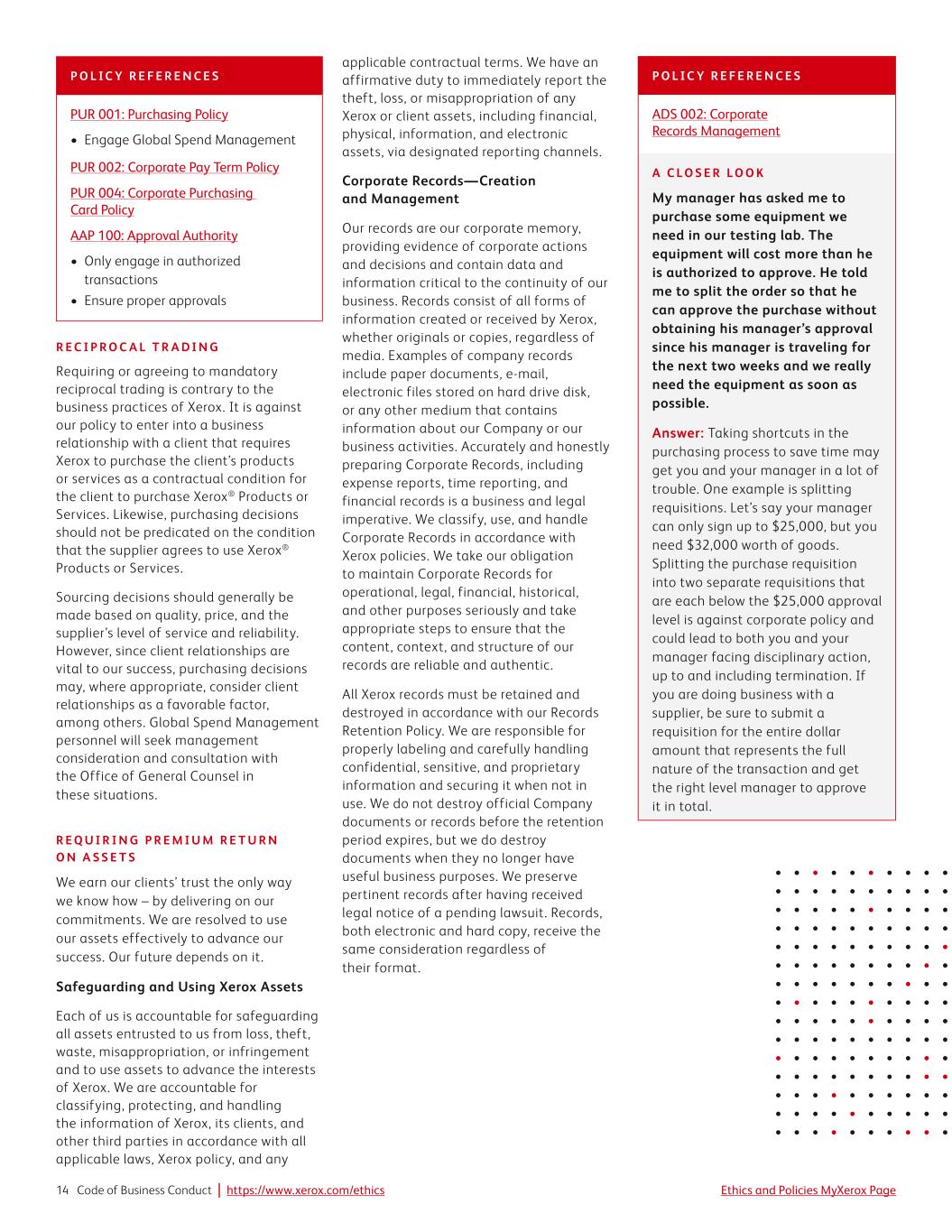
P O L I C Y R E F E R E N C E S ADS 002: Corporate Records Management A C L O S E R L O O K My manager has asked me to purchase some equipment we need in our testing lab. The equipment will cost more than he is authorized to approve. He told me to split the order so that he can approve the purchase without obtaining his manager’s approval since his manager is traveling for the next two weeks and we really need the equipment as soon as possible. Answer: Taking shortcuts in the purchasing process to save time may get you and your manager in a lot of trouble. One example is splitting requisitions. Let’s say your manager can only sign up to $25,000, but you need $32,000 worth of goods. Splitting the purchase requisition into two separate requisitions that are each below the $25,000 approval level is against corporate policy and could lead to both you and your manager facing disciplinary action, up to and including termination. If you are doing business with a supplier, be sure to submit a requisition for the entire dollar amount that represents the full nature of the transaction and get the right level manager to approve it in total. R E C I P R O C A L T R A D I N G Requiring or agreeing to mandatory reciprocal trading is contrary to the business practices of Xerox. It is against our policy to enter into a business relationship with a client that requires Xerox to purchase the client’s products or services as a contractual condition for the client to purchase Xerox® Products or Services. Likewise, purchasing decisions should not be predicated on the condition that the supplier agrees to use Xerox® Products or Services. Sourcing decisions should generally be made based on quality, price, and the supplier’s level of service and reliability. However, since client relationships are vital to our success, purchasing decisions may, where appropriate, consider client relationships as a favorable factor, among others. Global Spend Management personnel will seek management consideration and consultation with the Office of General Counsel in these situations. R E Q U I R I N G P R E M I U M R E T U R N O N A S S E T S We earn our clients’ trust the only way we know how – by delivering on our commitments. We are resolved to use our assets effectively to advance our success. Our future depends on it. Safeguarding and Using Xerox Assets Each of us is accountable for safeguarding all assets entrusted to us from loss, theft, waste, misappropriation, or infringement and to use assets to advance the interests of Xerox. We are accountable for classifying, protecting, and handling the information of Xerox, its clients, and other third parties in accordance with all applicable laws, Xerox policy, and any applicable contractual terms. We have an affirmative duty to immediately report the theft, loss, or misappropriation of any Xerox or client assets, including financial, physical, information, and electronic assets, via designated reporting channels. Corporate Records—Creation and Management Our records are our corporate memory, providing evidence of corporate actions and decisions and contain data and information critical to the continuity of our business. Records consist of all forms of information created or received by Xerox, whether originals or copies, regardless of media. Examples of company records include paper documents, e-mail, electronic files stored on hard drive disk, or any other medium that contains information about our Company or our business activities. Accurately and honestly preparing Corporate Records, including expense reports, time reporting, and financial records is a business and legal imperative. We classify, use, and handle Corporate Records in accordance with Xerox policies. We take our obligation to maintain Corporate Records for operational, legal, financial, historical, and other purposes seriously and take appropriate steps to ensure that the content, context, and structure of our records are reliable and authentic. All Xerox records must be retained and destroyed in accordance with our Records Retention Policy. We are responsible for properly labeling and carefully handling confidential, sensitive, and proprietary information and securing it when not in use. We do not destroy official Company documents or records before the retention period expires, but we do destroy documents when they no longer have useful business purposes. We preserve pertinent records after having received legal notice of a pending lawsuit. Records, both electronic and hard copy, receive the same consideration regardless of their format. 14 Code of Business Conduct | https://www.xerox.com/ethics Ethics and Policies MyXerox Page P O L I C Y R E F E R E N C E S PUR 001: Purchasing Policy • Engage Global Spend Management PUR 002: Corporate Pay Term Policy PUR 004: Corporate Purchasing Card Policy AAP 100: Approval Authority • Only engage in authorized transactions • Ensure proper approvals
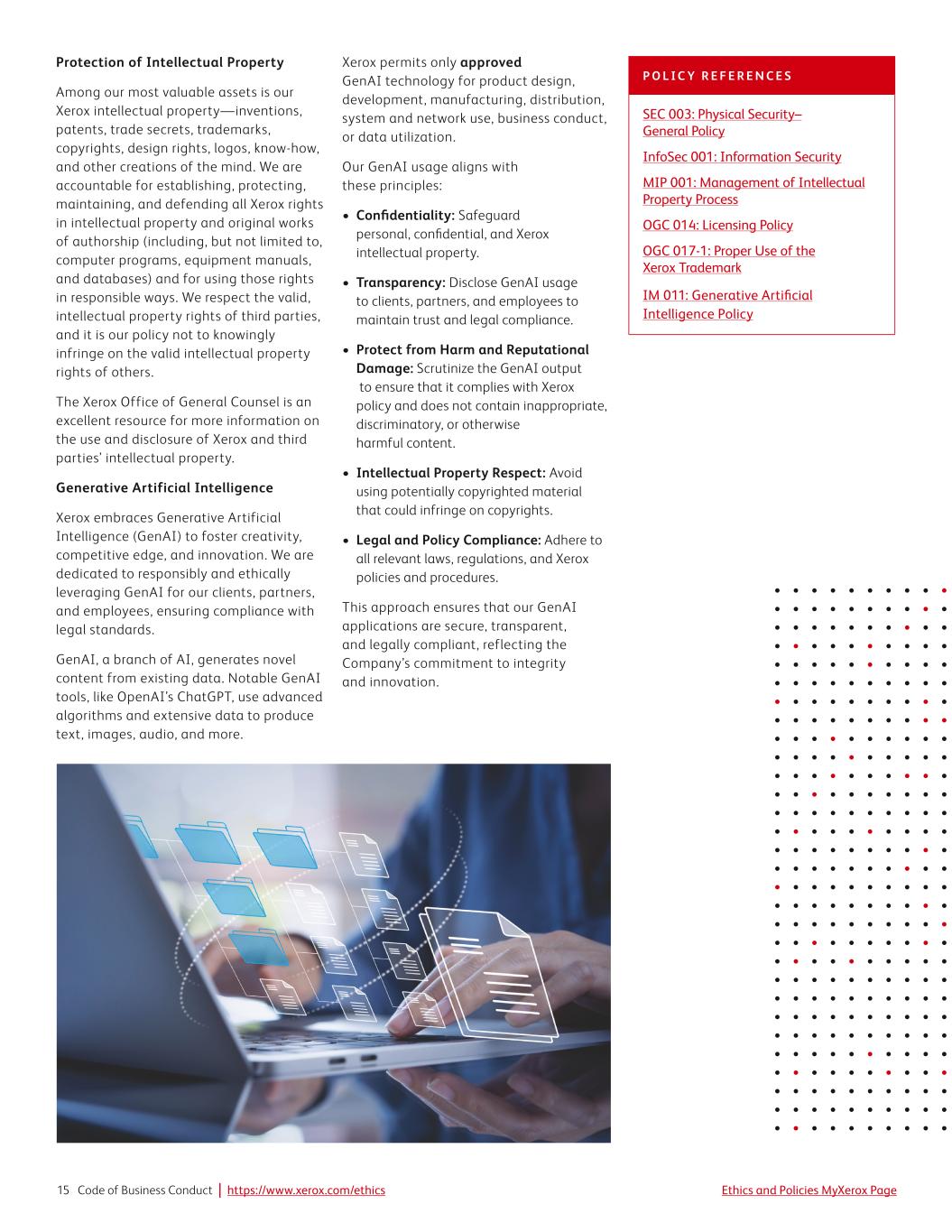
Protection of Intellectual Property Among our most valuable assets is our Xerox intellectual property—inventions, patents, trade secrets, trademarks, copyrights, design rights, logos, know-how, and other creations of the mind. We are accountable for establishing, protecting, maintaining, and defending all Xerox rights in intellectual property and original works of authorship (including, but not limited to, computer programs, equipment manuals, and databases) and for using those rights in responsible ways. We respect the valid, intellectual property rights of third parties, and it is our policy not to knowingly infringe on the valid intellectual property rights of others. The Xerox Office of General Counsel is an excellent resource for more information on the use and disclosure of Xerox and third parties’ intellectual property. Generative Artificial Intelligence Xerox embraces Generative Artificial Intelligence (GenAI) to foster creativity, competitive edge, and innovation. We are dedicated to responsibly and ethically leveraging GenAI for our clients, partners, and employees, ensuring compliance with legal standards. GenAI, a branch of AI, generates novel content from existing data. Notable GenAI tools, like OpenAI’s ChatGPT, use advanced algorithms and extensive data to produce text, images, audio, and more. P O L I C Y R E F E R E N C E S SEC 003: Physical Security– General Policy InfoSec 001: Information Security MIP 001: Management of Intellectual Property Process OGC 014: Licensing Policy OGC 017-1: Proper Use of the Xerox Trademark IM 011: Generative Artificial Intelligence Policy Xerox permits only approved GenAI technology for product design, development, manufacturing, distribution, system and network use, business conduct, or data utilization. Our GenAI usage aligns with these principles: • Confidentiality: Safeguard personal, confidential, and Xerox intellectual property. • Transparency: Disclose GenAI usage to clients, partners, and employees to maintain trust and legal compliance. • Protect from Harm and Reputational Damage: Scrutinize the GenAI output to ensure that it complies with Xerox policy and does not contain inappropriate, discriminatory, or otherwise harmful content. • Intellectual Property Respect: Avoid using potentially copyrighted material that could infringe on copyrights. • Legal and Policy Compliance: Adhere to all relevant laws, regulations, and Xerox policies and procedures. This approach ensures that our GenAI applications are secure, transparent, and legally compliant, reflecting the Company’s commitment to integrity and innovation. 15 Code of Business Conduct | https://www.xerox.com/ethics Ethics and Policies MyXerox Page
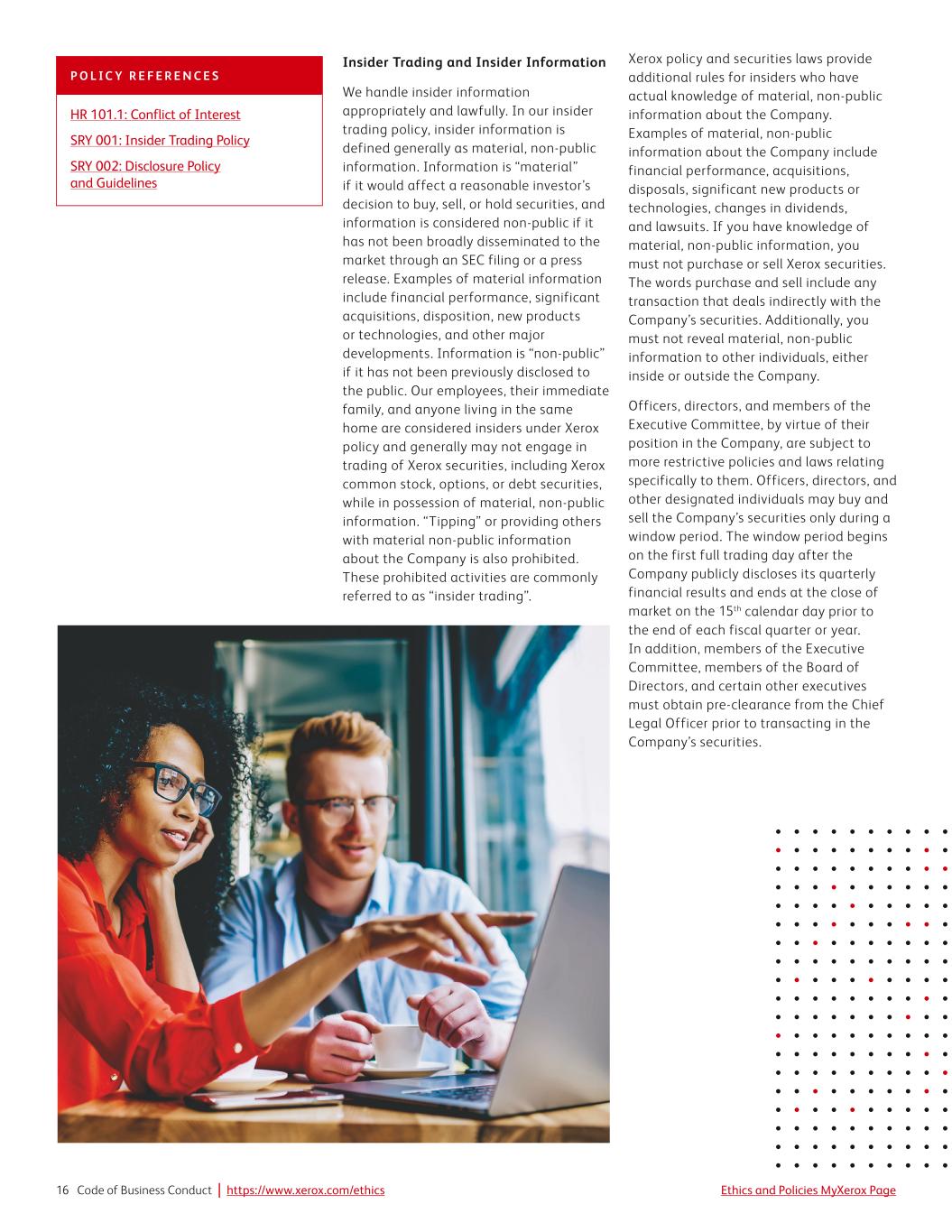
Insider Trading and Insider Information We handle insider information appropriately and lawfully. In our insider trading policy, insider information is defined generally as material, non-public information. Information is “material” if it would affect a reasonable investor’s decision to buy, sell, or hold securities, and information is considered non-public if it has not been broadly disseminated to the market through an SEC filing or a press release. Examples of material information include financial performance, significant acquisitions, disposition, new products or technologies, and other major developments. Information is “non-public” if it has not been previously disclosed to the public. Our employees, their immediate family, and anyone living in the same home are considered insiders under Xerox policy and generally may not engage in trading of Xerox securities, including Xerox common stock, options, or debt securities, while in possession of material, non-public information. “Tipping” or providing others with material non-public information about the Company is also prohibited. These prohibited activities are commonly referred to as “insider trading”. Xerox policy and securities laws provide additional rules for insiders who have actual knowledge of material, non-public information about the Company. Examples of material, non-public information about the Company include financial performance, acquisitions, disposals, significant new products or technologies, changes in dividends, and lawsuits. If you have knowledge of material, non-public information, you must not purchase or sell Xerox securities. The words purchase and sell include any transaction that deals indirectly with the Company’s securities. Additionally, you must not reveal material, non-public information to other individuals, either inside or outside the Company. Officers, directors, and members of the Executive Committee, by virtue of their position in the Company, are subject to more restrictive policies and laws relating specifically to them. Officers, directors, and other designated individuals may buy and sell the Company’s securities only during a window period. The window period begins on the first full trading day after the Company publicly discloses its quarterly financial results and ends at the close of market on the 15th calendar day prior to the end of each fiscal quarter or year. In addition, members of the Executive Committee, members of the Board of Directors, and certain other executives must obtain pre-clearance from the Chief Legal Officer prior to transacting in the Company’s securities. P O L I C Y R E F E R E N C E S HR 101.1: Conflict of Interest SRY 001: Insider Trading Policy SRY 002: Disclosure Policy and Guidelines 16 Code of Business Conduct | https://www.xerox.com/ethics Ethics and Policies MyXerox Page
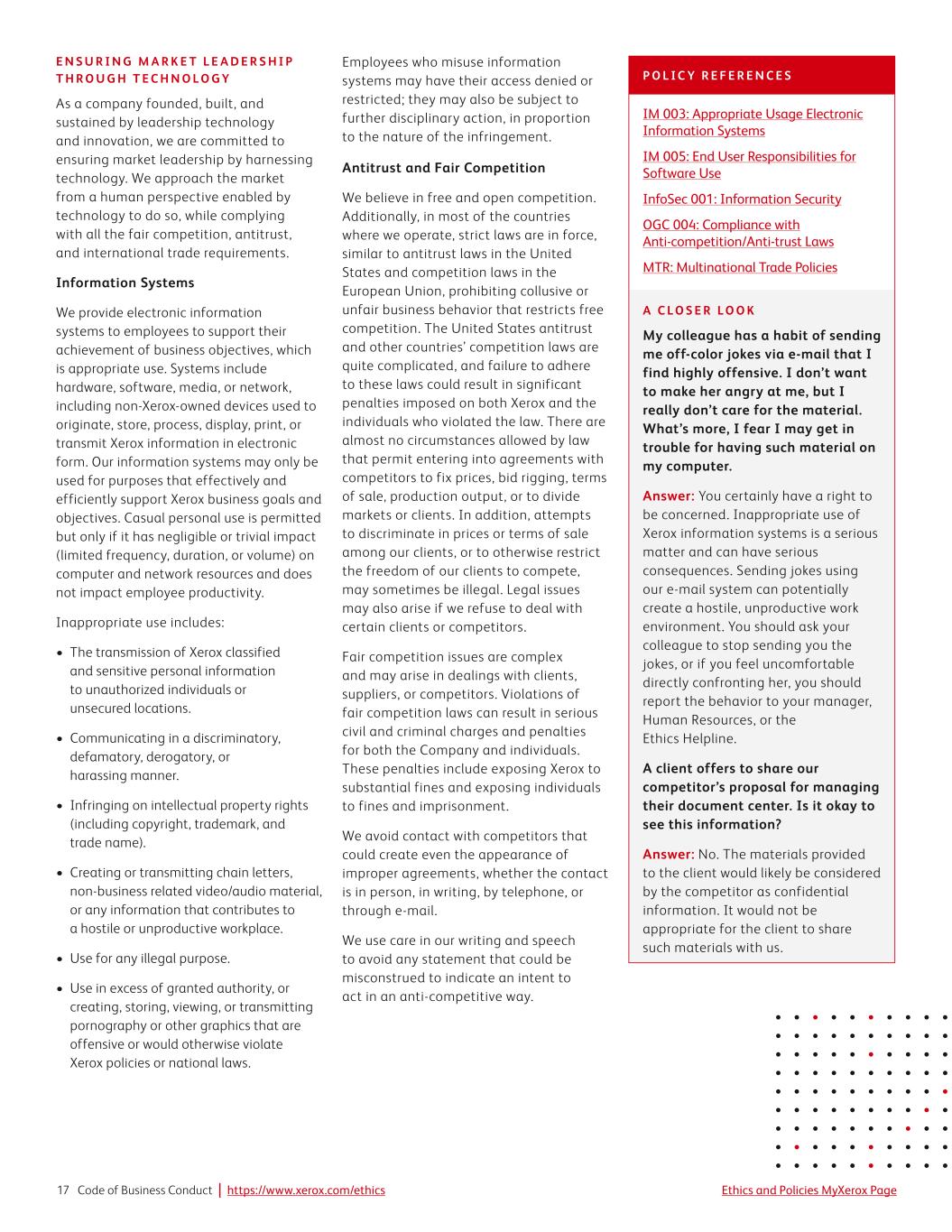
E N S U R I N G M A R K E T L E A D E R S H I P T H R O U G H T E C H N O L O G Y As a company founded, built, and sustained by leadership technology and innovation, we are committed to ensuring market leadership by harnessing technology. We approach the market from a human perspective enabled by technology to do so, while complying with all the fair competition, antitrust, and international trade requirements. Information Systems We provide electronic information systems to employees to support their achievement of business objectives, which is appropriate use. Systems include hardware, software, media, or network, including non-Xerox-owned devices used to originate, store, process, display, print, or transmit Xerox information in electronic form. Our information systems may only be used for purposes that effectively and efficiently support Xerox business goals and objectives. Casual personal use is permitted but only if it has negligible or trivial impact (limited frequency, duration, or volume) on computer and network resources and does not impact employee productivity. Inappropriate use includes: • The transmission of Xerox classified and sensitive personal information to unauthorized individuals or unsecured locations. • Communicating in a discriminatory, defamatory, derogatory, or harassing manner. • Infringing on intellectual property rights (including copyright, trademark, and trade name). • Creating or transmitting chain letters, non-business related video/audio material, or any information that contributes to a hostile or unproductive workplace. • Use for any illegal purpose. • Use in excess of granted authority, or creating, storing, viewing, or transmitting pornography or other graphics that are offensive or would otherwise violate Xerox policies or national laws. Employees who misuse information systems may have their access denied or restricted; they may also be subject to further disciplinary action, in proportion to the nature of the infringement. Antitrust and Fair Competition We believe in free and open competition. Additionally, in most of the countries where we operate, strict laws are in force, similar to antitrust laws in the United States and competition laws in the European Union, prohibiting collusive or unfair business behavior that restricts free competition. The United States antitrust and other countries’ competition laws are quite complicated, and failure to adhere to these laws could result in significant penalties imposed on both Xerox and the individuals who violated the law. There are almost no circumstances allowed by law that permit entering into agreements with competitors to fix prices, bid rigging, terms of sale, production output, or to divide markets or clients. In addition, attempts to discriminate in prices or terms of sale among our clients, or to otherwise restrict the freedom of our clients to compete, may sometimes be illegal. Legal issues may also arise if we refuse to deal with certain clients or competitors. Fair competition issues are complex and may arise in dealings with clients, suppliers, or competitors. Violations of fair competition laws can result in serious civil and criminal charges and penalties for both the Company and individuals. These penalties include exposing Xerox to substantial fines and exposing individuals to fines and imprisonment. We avoid contact with competitors that could create even the appearance of improper agreements, whether the contact is in person, in writing, by telephone, or through e-mail. We use care in our writing and speech to avoid any statement that could be misconstrued to indicate an intent to act in an anti-competitive way. P O L I C Y R E F E R E N C E S IM 003: Appropriate Usage Electronic Information Systems IM 005: End User Responsibilities for Software Use InfoSec 001: Information Security OGC 004: Compliance with Anti-competition/Anti-trust Laws MTR: Multinational Trade Policies A C L O S E R L O O K My colleague has a habit of sending me off-color jokes via e-mail that I find highly offensive. I don’t want to make her angry at me, but I really don’t care for the material. What’s more, I fear I may get in trouble for having such material on my computer. Answer: You certainly have a right to be concerned. Inappropriate use of Xerox information systems is a serious matter and can have serious consequences. Sending jokes using our e-mail system can potentially create a hostile, unproductive work environment. You should ask your colleague to stop sending you the jokes, or if you feel uncomfortable directly confronting her, you should report the behavior to your manager, Human Resources, or the Ethics Helpline. A client offers to share our competitor’s proposal for managing their document center. Is it okay to see this information? Answer: No. The materials provided to the client would likely be considered by the competitor as confidential information. It would not be appropriate for the client to share such materials with us. 17 Code of Business Conduct | https://www.xerox.com/ethics Ethics and Policies MyXerox Page
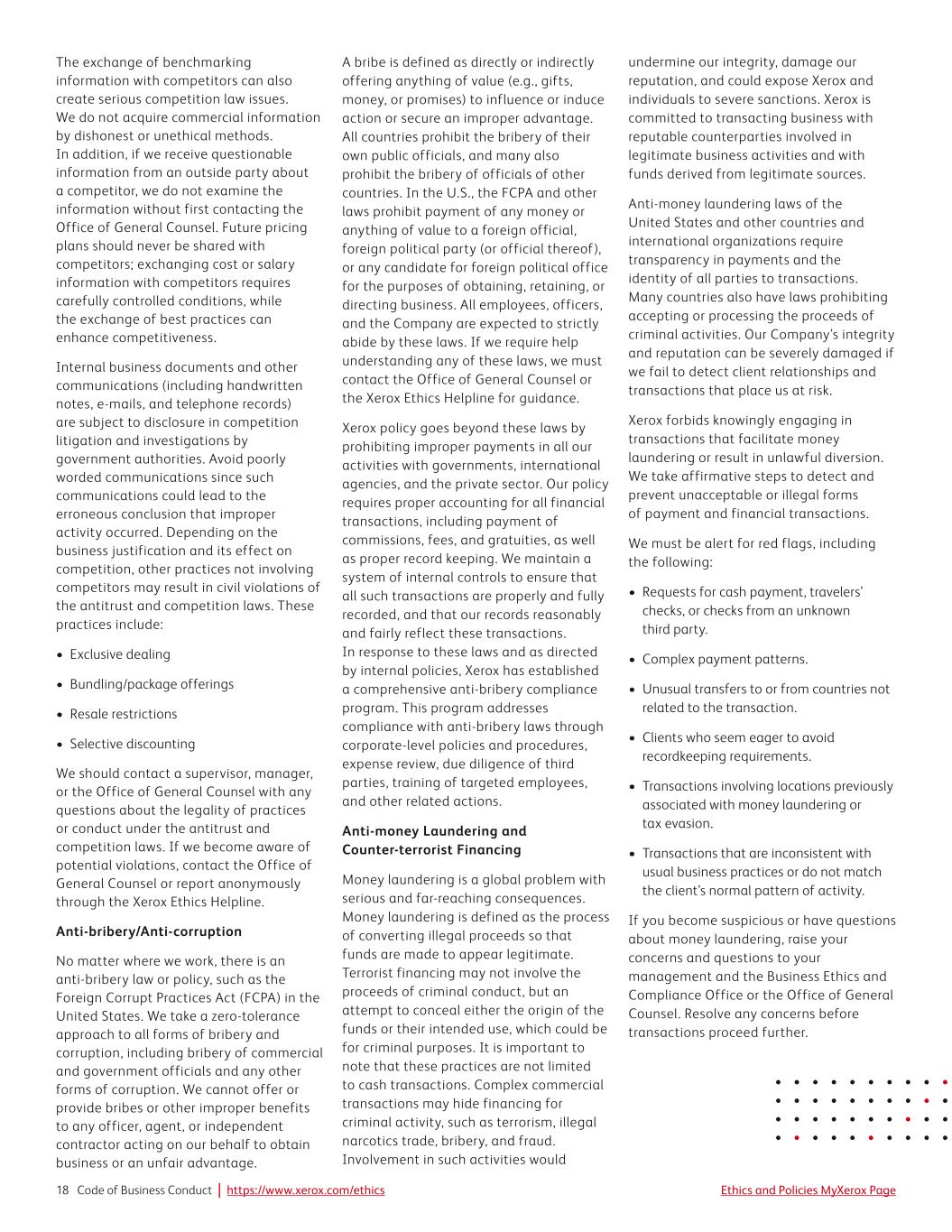
The exchange of benchmarking information with competitors can also create serious competition law issues. We do not acquire commercial information by dishonest or unethical methods. In addition, if we receive questionable information from an outside party about a competitor, we do not examine the information without first contacting the Office of General Counsel. Future pricing plans should never be shared with competitors; exchanging cost or salary information with competitors requires carefully controlled conditions, while the exchange of best practices can enhance competitiveness. Internal business documents and other communications (including handwritten notes, e-mails, and telephone records) are subject to disclosure in competition litigation and investigations by government authorities. Avoid poorly worded communications since such communications could lead to the erroneous conclusion that improper activity occurred. Depending on the business justification and its effect on competition, other practices not involving competitors may result in civil violations of the antitrust and competition laws. These practices include: • Exclusive dealing • Bundling/package offerings • Resale restrictions • Selective discounting We should contact a supervisor, manager, or the Office of General Counsel with any questions about the legality of practices or conduct under the antitrust and competition laws. If we become aware of potential violations, contact the Office of General Counsel or report anonymously through the Xerox Ethics Helpline. Anti-bribery/Anti-corruption No matter where we work, there is an anti-bribery law or policy, such as the Foreign Corrupt Practices Act (FCPA) in the United States. We take a zero-tolerance approach to all forms of bribery and corruption, including bribery of commercial and government officials and any other forms of corruption. We cannot offer or provide bribes or other improper benefits to any officer, agent, or independent contractor acting on our behalf to obtain business or an unfair advantage. A bribe is defined as directly or indirectly offering anything of value (e.g., gifts, money, or promises) to influence or induce action or secure an improper advantage. All countries prohibit the bribery of their own public officials, and many also prohibit the bribery of officials of other countries. In the U.S., the FCPA and other laws prohibit payment of any money or anything of value to a foreign official, foreign political party (or official thereof), or any candidate for foreign political office for the purposes of obtaining, retaining, or directing business. All employees, officers, and the Company are expected to strictly abide by these laws. If we require help understanding any of these laws, we must contact the Office of General Counsel or the Xerox Ethics Helpline for guidance. Xerox policy goes beyond these laws by prohibiting improper payments in all our activities with governments, international agencies, and the private sector. Our policy requires proper accounting for all financial transactions, including payment of commissions, fees, and gratuities, as well as proper record keeping. We maintain a system of internal controls to ensure that all such transactions are properly and fully recorded, and that our records reasonably and fairly reflect these transactions. In response to these laws and as directed by internal policies, Xerox has established a comprehensive anti-bribery compliance program. This program addresses compliance with anti-bribery laws through corporate-level policies and procedures, expense review, due diligence of third parties, training of targeted employees, and other related actions. Anti-money Laundering and Counter-terrorist Financing Money laundering is a global problem with serious and far-reaching consequences. Money laundering is defined as the process of converting illegal proceeds so that funds are made to appear legitimate. Terrorist financing may not involve the proceeds of criminal conduct, but an attempt to conceal either the origin of the funds or their intended use, which could be for criminal purposes. It is important to note that these practices are not limited to cash transactions. Complex commercial transactions may hide financing for criminal activity, such as terrorism, illegal narcotics trade, bribery, and fraud. Involvement in such activities would undermine our integrity, damage our reputation, and could expose Xerox and individuals to severe sanctions. Xerox is committed to transacting business with reputable counterparties involved in legitimate business activities and with funds derived from legitimate sources. Anti-money laundering laws of the United States and other countries and international organizations require transparency in payments and the identity of all parties to transactions. Many countries also have laws prohibiting accepting or processing the proceeds of criminal activities. Our Company’s integrity and reputation can be severely damaged if we fail to detect client relationships and transactions that place us at risk. Xerox forbids knowingly engaging in transactions that facilitate money laundering or result in unlawful diversion. We take affirmative steps to detect and prevent unacceptable or illegal forms of payment and financial transactions. We must be alert for red flags, including the following: • Requests for cash payment, travelers’ checks, or checks from an unknown third party. • Complex payment patterns. • Unusual transfers to or from countries not related to the transaction. • Clients who seem eager to avoid recordkeeping requirements. • Transactions involving locations previously associated with money laundering or tax evasion. • Transactions that are inconsistent with usual business practices or do not match the client’s normal pattern of activity. If you become suspicious or have questions about money laundering, raise your concerns and questions to your management and the Business Ethics and Compliance Office or the Office of General Counsel. Resolve any concerns before transactions proceed further. 18 Code of Business Conduct | https://www.xerox.com/ethics Ethics and Policies MyXerox Page
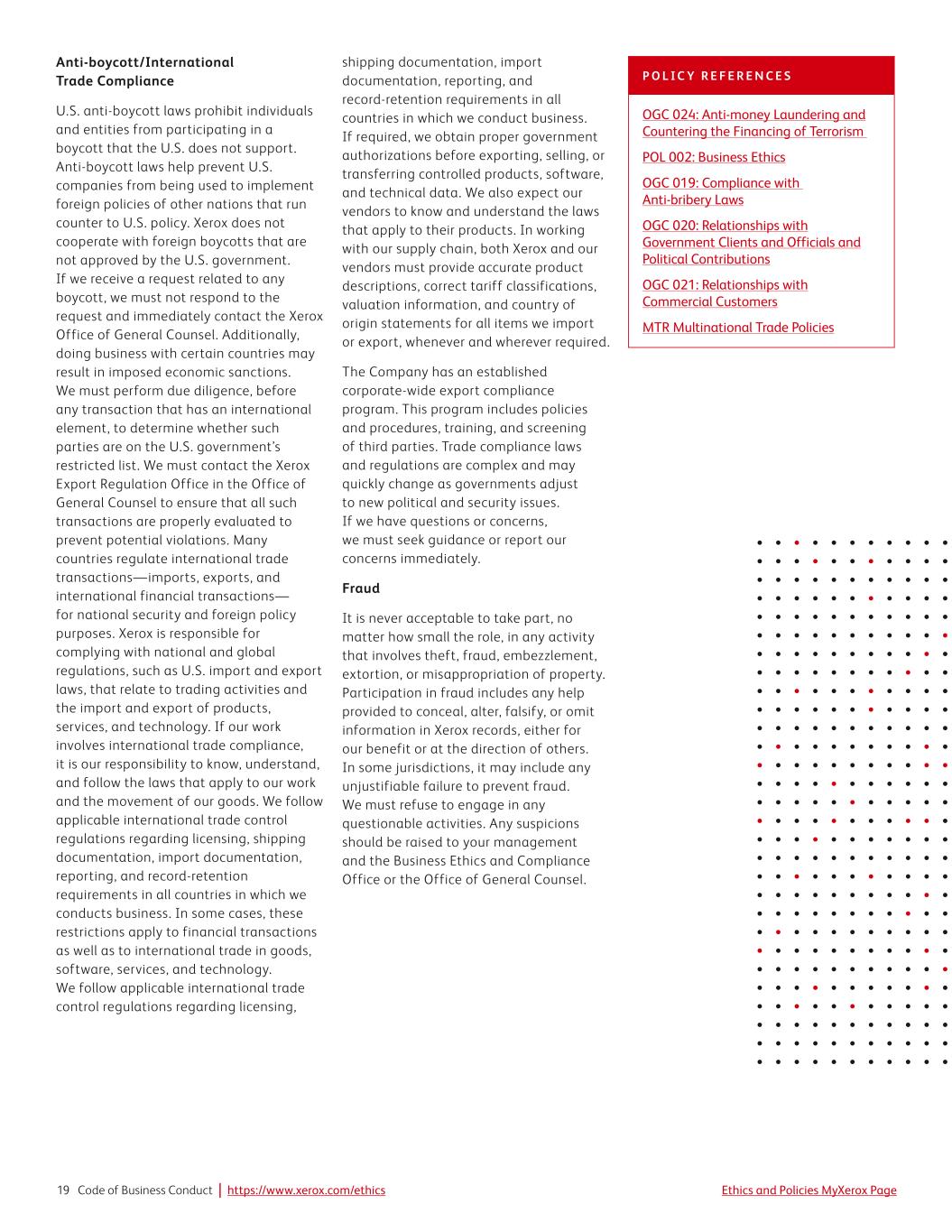
Anti-boycott/International Trade Compliance U.S. anti-boycott laws prohibit individuals and entities from participating in a boycott that the U.S. does not support. Anti-boycott laws help prevent U.S. companies from being used to implement foreign policies of other nations that run counter to U.S. policy. Xerox does not cooperate with foreign boycotts that are not approved by the U.S. government. If we receive a request related to any boycott, we must not respond to the request and immediately contact the Xerox Office of General Counsel. Additionally, doing business with certain countries may result in imposed economic sanctions. We must perform due diligence, before any transaction that has an international element, to determine whether such parties are on the U.S. government’s restricted list. We must contact the Xerox Export Regulation Office in the Office of General Counsel to ensure that all such transactions are properly evaluated to prevent potential violations. Many countries regulate international trade transactions—imports, exports, and international financial transactions— for national security and foreign policy purposes. Xerox is responsible for complying with national and global regulations, such as U.S. import and export laws, that relate to trading activities and the import and export of products, services, and technology. If our work involves international trade compliance, it is our responsibility to know, understand, and follow the laws that apply to our work and the movement of our goods. We follow applicable international trade control regulations regarding licensing, shipping documentation, import documentation, reporting, and record-retention requirements in all countries in which we conducts business. In some cases, these restrictions apply to financial transactions as well as to international trade in goods, software, services, and technology. We follow applicable international trade control regulations regarding licensing, shipping documentation, import documentation, reporting, and record-retention requirements in all countries in which we conduct business. If required, we obtain proper government authorizations before exporting, selling, or transferring controlled products, software, and technical data. We also expect our vendors to know and understand the laws that apply to their products. In working with our supply chain, both Xerox and our vendors must provide accurate product descriptions, correct tariff classifications, valuation information, and country of origin statements for all items we import or export, whenever and wherever required. The Company has an established corporate-wide export compliance program. This program includes policies and procedures, training, and screening of third parties. Trade compliance laws and regulations are complex and may quickly change as governments adjust to new political and security issues. If we have questions or concerns, we must seek guidance or report our concerns immediately. Fraud It is never acceptable to take part, no matter how small the role, in any activity that involves theft, fraud, embezzlement, extortion, or misappropriation of property. Participation in fraud includes any help provided to conceal, alter, falsify, or omit information in Xerox records, either for our benefit or at the direction of others. In some jurisdictions, it may include any unjustifiable failure to prevent fraud. We must refuse to engage in any questionable activities. Any suspicions should be raised to your management and the Business Ethics and Compliance Office or the Office of General Counsel. P O L I C Y R E F E R E N C E S OGC 024: Anti-money Laundering and Countering the Financing of Terrorism POL 002: Business Ethics OGC 019: Compliance with Anti-bribery Laws OGC 020: Relationships with Government Clients and Officials and Political Contributions OGC 021: Relationships with Commercial Customers MTR Multinational Trade Policies 19 Code of Business Conduct | https://www.xerox.com/ethics Ethics and Policies MyXerox Page
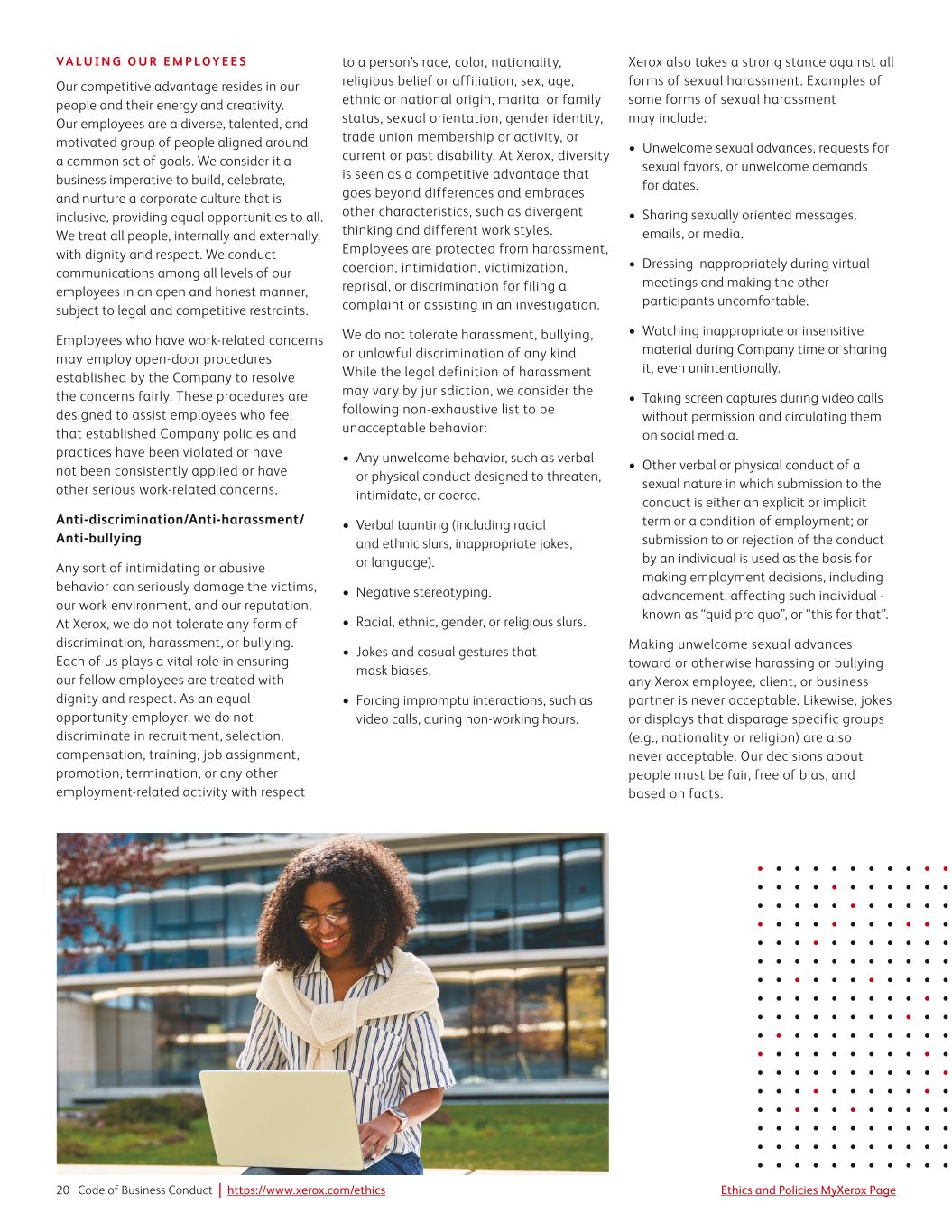
VA L U I N G O U R E M P L O Y E E S Our competitive advantage resides in our people and their energy and creativity. Our employees are a diverse, talented, and motivated group of people aligned around a common set of goals. We consider it a business imperative to build, celebrate, and nurture a corporate culture that is inclusive, providing equal opportunities to all. We treat all people, internally and externally, with dignity and respect. We conduct communications among all levels of our employees in an open and honest manner, subject to legal and competitive restraints. Employees who have work-related concerns may employ open-door procedures established by the Company to resolve the concerns fairly. These procedures are designed to assist employees who feel that established Company policies and practices have been violated or have not been consistently applied or have other serious work-related concerns. Anti-discrimination/Anti-harassment/ Anti-bullying Any sort of intimidating or abusive behavior can seriously damage the victims, our work environment, and our reputation. At Xerox, we do not tolerate any form of discrimination, harassment, or bullying. Each of us plays a vital role in ensuring our fellow employees are treated with dignity and respect. As an equal opportunity employer, we do not discriminate in recruitment, selection, compensation, training, job assignment, promotion, termination, or any other employment-related activity with respect to a person’s race, color, nationality, religious belief or affiliation, sex, age, ethnic or national origin, marital or family status, sexual orientation, gender identity, trade union membership or activity, or current or past disability. At Xerox, diversity is seen as a competitive advantage that goes beyond differences and embraces other characteristics, such as divergent thinking and different work styles. Employees are protected from harassment, coercion, intimidation, victimization, reprisal, or discrimination for filing a complaint or assisting in an investigation. We do not tolerate harassment, bullying, or unlawful discrimination of any kind. While the legal definition of harassment may vary by jurisdiction, we consider the following non-exhaustive list to be unacceptable behavior: • Any unwelcome behavior, such as verbal or physical conduct designed to threaten, intimidate, or coerce. • Verbal taunting (including racial and ethnic slurs, inappropriate jokes, or language). • Negative stereotyping. • Racial, ethnic, gender, or religious slurs. • Jokes and casual gestures that mask biases. • Forcing impromptu interactions, such as video calls, during non-working hours. Xerox also takes a strong stance against all forms of sexual harassment. Examples of some forms of sexual harassment may include: • Unwelcome sexual advances, requests for sexual favors, or unwelcome demands for dates. • Sharing sexually oriented messages, emails, or media. • Dressing inappropriately during virtual meetings and making the other participants uncomfortable. • Watching inappropriate or insensitive material during Company time or sharing it, even unintentionally. • Taking screen captures during video calls without permission and circulating them on social media. • Other verbal or physical conduct of a sexual nature in which submission to the conduct is either an explicit or implicit term or a condition of employment; or submission to or rejection of the conduct by an individual is used as the basis for making employment decisions, including advancement, affecting such individual - known as “quid pro quo”, or “this for that”. Making unwelcome sexual advances toward or otherwise harassing or bullying any Xerox employee, client, or business partner is never acceptable. Likewise, jokes or displays that disparage specific groups (e.g., nationality or religion) are also never acceptable. Our decisions about people must be fair, free of bias, and based on facts. 20 Code of Business Conduct | https://www.xerox.com/ethics Ethics and Policies MyXerox Page
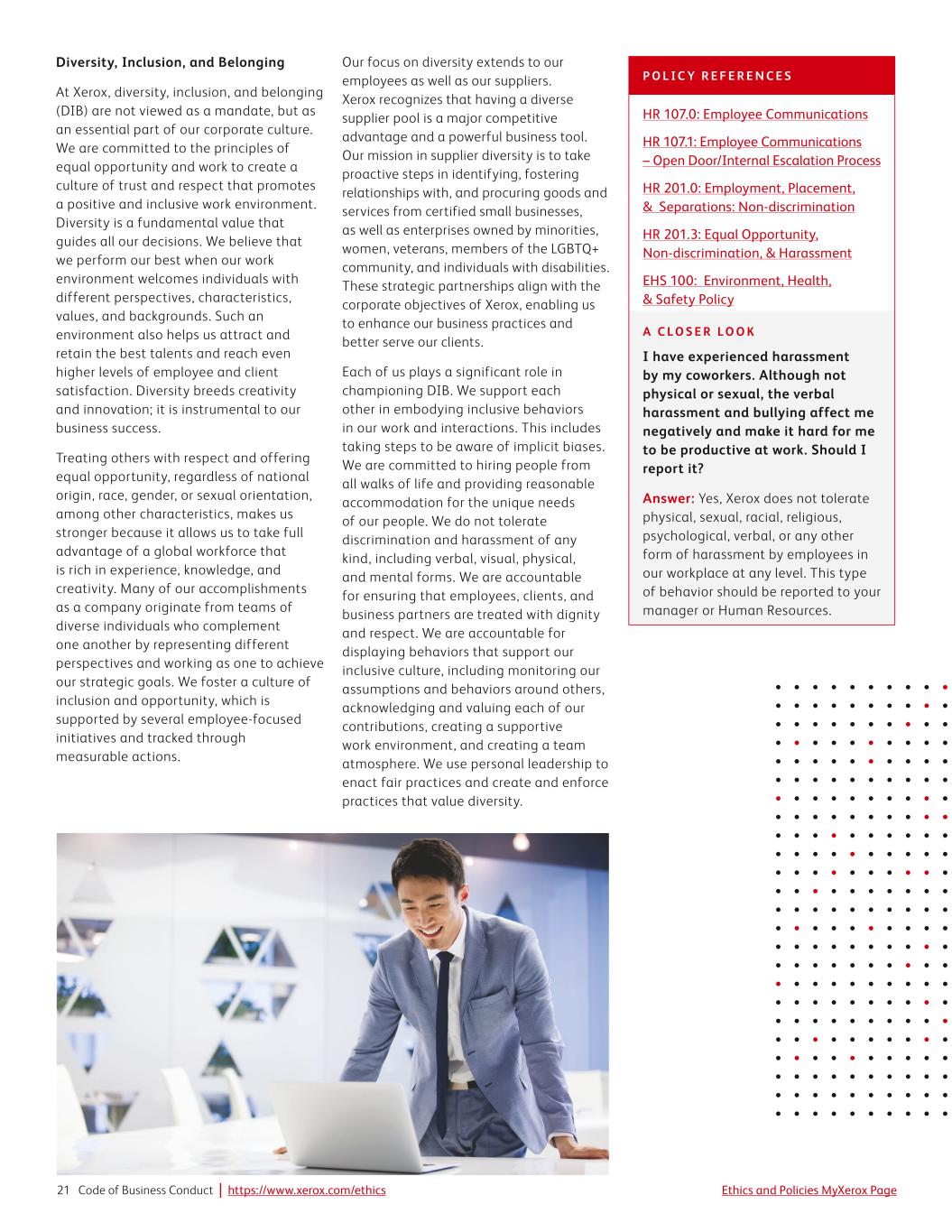
Diversity, Inclusion, and Belonging At Xerox, diversity, inclusion, and belonging (DIB) are not viewed as a mandate, but as an essential part of our corporate culture. We are committed to the principles of equal opportunity and work to create a culture of trust and respect that promotes a positive and inclusive work environment. Diversity is a fundamental value that guides all our decisions. We believe that we perform our best when our work environment welcomes individuals with different perspectives, characteristics, values, and backgrounds. Such an environment also helps us attract and retain the best talents and reach even higher levels of employee and client satisfaction. Diversity breeds creativity and innovation; it is instrumental to our business success. Treating others with respect and offering equal opportunity, regardless of national origin, race, gender, or sexual orientation, among other characteristics, makes us stronger because it allows us to take full advantage of a global workforce that is rich in experience, knowledge, and creativity. Many of our accomplishments as a company originate from teams of diverse individuals who complement one another by representing different perspectives and working as one to achieve our strategic goals. We foster a culture of inclusion and opportunity, which is supported by several employee-focused initiatives and tracked through measurable actions. Our focus on diversity extends to our employees as well as our suppliers. Xerox recognizes that having a diverse supplier pool is a major competitive advantage and a powerful business tool. Our mission in supplier diversity is to take proactive steps in identifying, fostering relationships with, and procuring goods and services from certified small businesses, as well as enterprises owned by minorities, women, veterans, members of the LGBTQ+ community, and individuals with disabilities. These strategic partnerships align with the corporate objectives of Xerox, enabling us to enhance our business practices and better serve our clients. Each of us plays a significant role in championing DIB. We support each other in embodying inclusive behaviors in our work and interactions. This includes taking steps to be aware of implicit biases. We are committed to hiring people from all walks of life and providing reasonable accommodation for the unique needs of our people. We do not tolerate discrimination and harassment of any kind, including verbal, visual, physical, and mental forms. We are accountable for ensuring that employees, clients, and business partners are treated with dignity and respect. We are accountable for displaying behaviors that support our inclusive culture, including monitoring our assumptions and behaviors around others, acknowledging and valuing each of our contributions, creating a supportive work environment, and creating a team atmosphere. We use personal leadership to enact fair practices and create and enforce practices that value diversity. P O L I C Y R E F E R E N C E S HR 107.0: Employee Communications HR 107.1: Employee Communications – Open Door/Internal Escalation Process HR 201.0: Employment, Placement, & Separations: Non-discrimination HR 201.3: Equal Opportunity, Non-discrimination, & Harassment EHS 100: Environment, Health, & Safety Policy A C L O S E R L O O K I have experienced harassment by my coworkers. Although not physical or sexual, the verbal harassment and bullying affect me negatively and make it hard for me to be productive at work. Should I report it? Answer: Yes, Xerox does not tolerate physical, sexual, racial, religious, psychological, verbal, or any other form of harassment by employees in our workplace at any level. This type of behavior should be reported to your manager or Human Resources. 21 Code of Business Conduct | https://www.xerox.com/ethics Ethics and Policies MyXerox Page
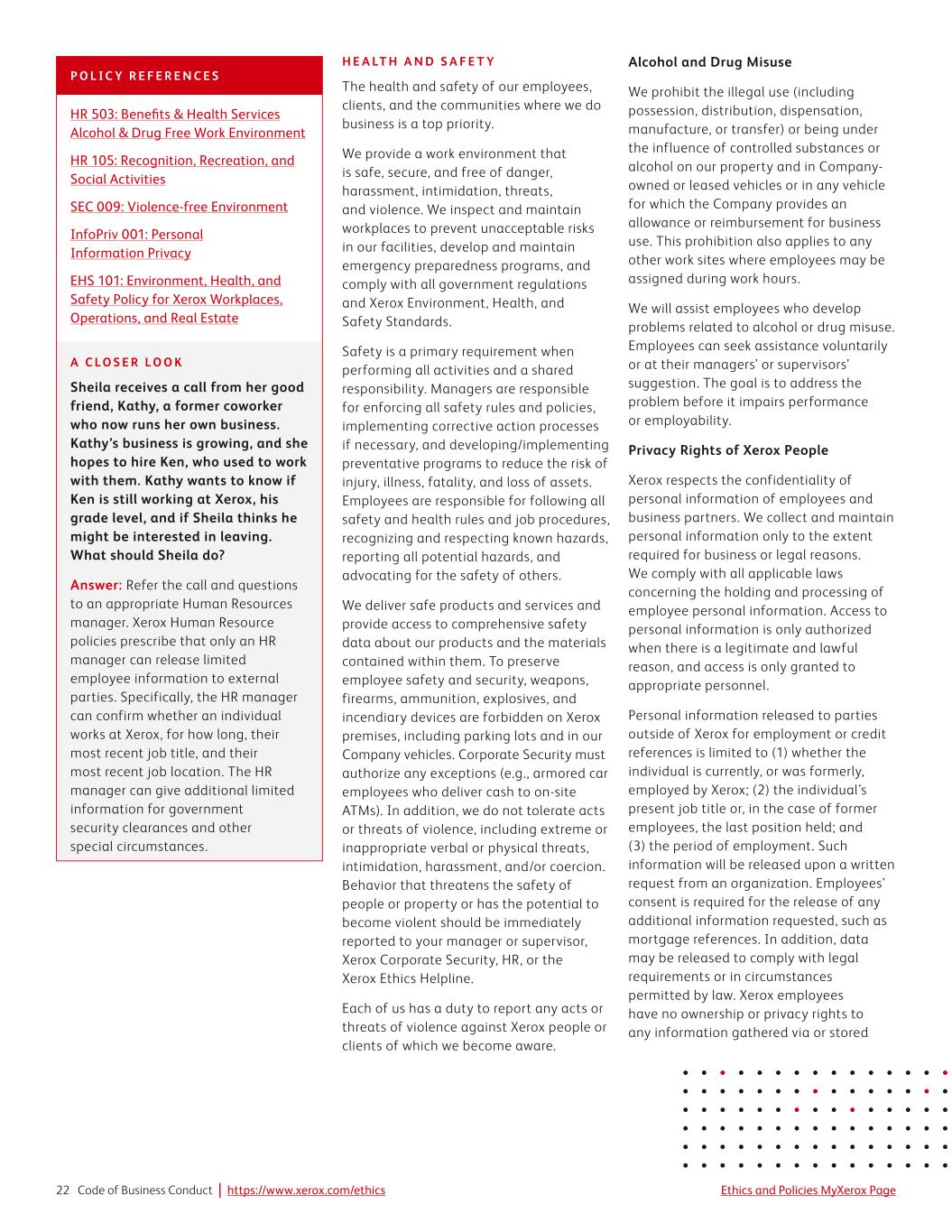
H E A LT H A N D S A F E T Y The health and safety of our employees, clients, and the communities where we do business is a top priority. We provide a work environment that is safe, secure, and free of danger, harassment, intimidation, threats, and violence. We inspect and maintain workplaces to prevent unacceptable risks in our facilities, develop and maintain emergency preparedness programs, and comply with all government regulations and Xerox Environment, Health, and Safety Standards. Safety is a primary requirement when performing all activities and a shared responsibility. Managers are responsible for enforcing all safety rules and policies, implementing corrective action processes if necessary, and developing/implementing preventative programs to reduce the risk of injury, illness, fatality, and loss of assets. Employees are responsible for following all safety and health rules and job procedures, recognizing and respecting known hazards, reporting all potential hazards, and advocating for the safety of others. We deliver safe products and services and provide access to comprehensive safety data about our products and the materials contained within them. To preserve employee safety and security, weapons, firearms, ammunition, explosives, and incendiary devices are forbidden on Xerox premises, including parking lots and in our Company vehicles. Corporate Security must authorize any exceptions (e.g., armored car employees who deliver cash to on-site ATMs). In addition, we do not tolerate acts or threats of violence, including extreme or inappropriate verbal or physical threats, intimidation, harassment, and/or coercion. Behavior that threatens the safety of people or property or has the potential to become violent should be immediately reported to your manager or supervisor, Xerox Corporate Security, HR, or the Xerox Ethics Helpline. Each of us has a duty to report any acts or threats of violence against Xerox people or clients of which we become aware. Alcohol and Drug Misuse We prohibit the illegal use (including possession, distribution, dispensation, manufacture, or transfer) or being under the influence of controlled substances or alcohol on our property and in Company- owned or leased vehicles or in any vehicle for which the Company provides an allowance or reimbursement for business use. This prohibition also applies to any other work sites where employees may be assigned during work hours. We will assist employees who develop problems related to alcohol or drug misuse. Employees can seek assistance voluntarily or at their managers’ or supervisors’ suggestion. The goal is to address the problem before it impairs performance or employability. Privacy Rights of Xerox People Xerox respects the confidentiality of personal information of employees and business partners. We collect and maintain personal information only to the extent required for business or legal reasons. We comply with all applicable laws concerning the holding and processing of employee personal information. Access to personal information is only authorized when there is a legitimate and lawful reason, and access is only granted to appropriate personnel. Personal information released to parties outside of Xerox for employment or credit references is limited to (1) whether the individual is currently, or was formerly, employed by Xerox; (2) the individual’s present job title or, in the case of former employees, the last position held; and (3) the period of employment. Such information will be released upon a written request from an organization. Employees’ consent is required for the release of any additional information requested, such as mortgage references. In addition, data may be released to comply with legal requirements or in circumstances permitted by law. Xerox employees have no ownership or privacy rights to any information gathered via or stored P O L I C Y R E F E R E N C E S HR 503: Benefits & Health Services Alcohol & Drug Free Work Environment HR 105: Recognition, Recreation, and Social Activities SEC 009: Violence-free Environment InfoPriv 001: Personal Information Privacy EHS 101: Environment, Health, and Safety Policy for Xerox Workplaces, Operations, and Real Estate A C L O S E R L O O K Sheila receives a call from her good friend, Kathy, a former coworker who now runs her own business. Kathy’s business is growing, and she hopes to hire Ken, who used to work with them. Kathy wants to know if Ken is still working at Xerox, his grade level, and if Sheila thinks he might be interested in leaving. What should Sheila do? Answer: Refer the call and questions to an appropriate Human Resources manager. Xerox Human Resource policies prescribe that only an HR manager can release limited employee information to external parties. Specifically, the HR manager can confirm whether an individual works at Xerox, for how long, their most recent job title, and their most recent job location. The HR manager can give additional limited information for government security clearances and other special circumstances. 22 Code of Business Conduct | https://www.xerox.com/ethics Ethics and Policies MyXerox Page
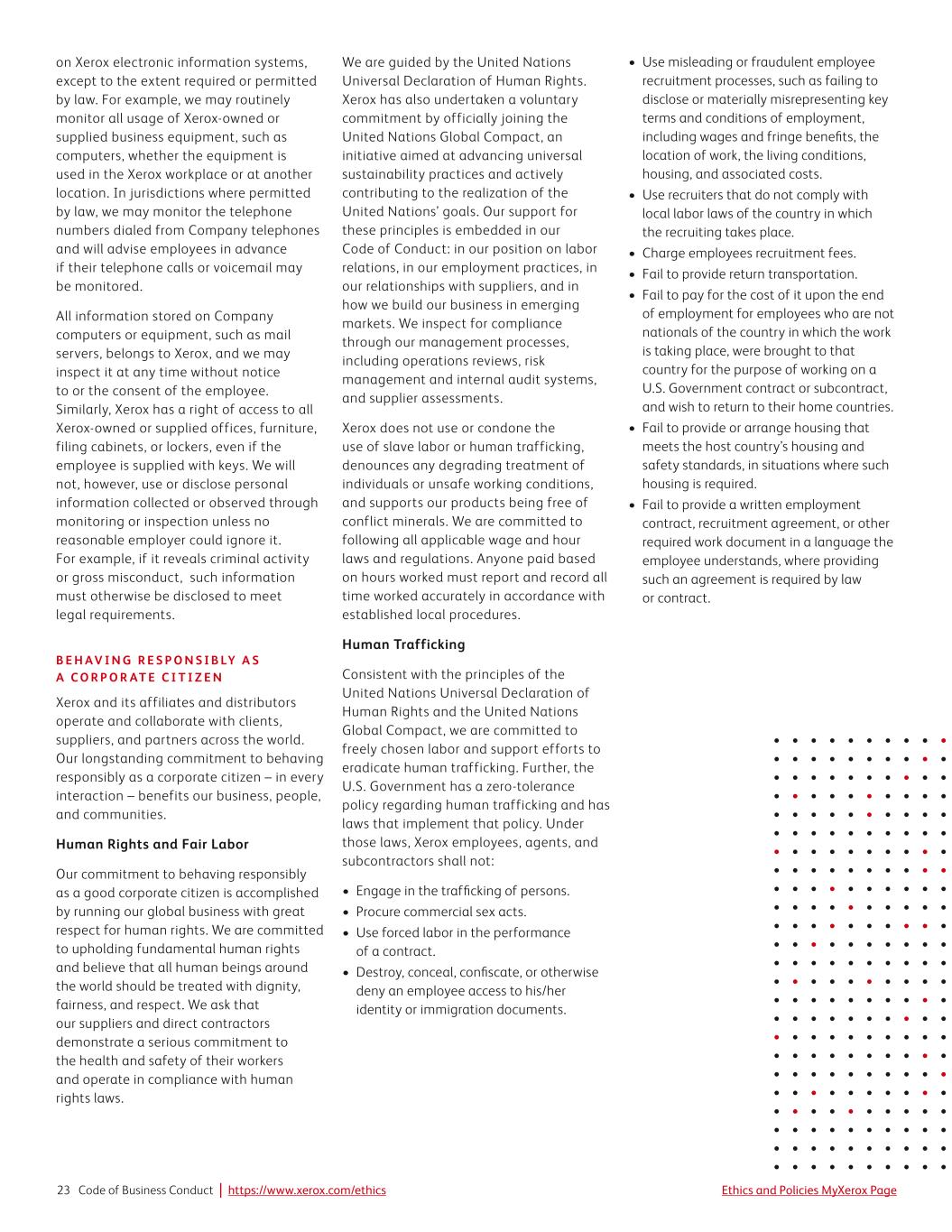
on Xerox electronic information systems, except to the extent required or permitted by law. For example, we may routinely monitor all usage of Xerox-owned or supplied business equipment, such as computers, whether the equipment is used in the Xerox workplace or at another location. In jurisdictions where permitted by law, we may monitor the telephone numbers dialed from Company telephones and will advise employees in advance if their telephone calls or voicemail may be monitored. All information stored on Company computers or equipment, such as mail servers, belongs to Xerox, and we may inspect it at any time without notice to or the consent of the employee. Similarly, Xerox has a right of access to all Xerox-owned or supplied offices, furniture, filing cabinets, or lockers, even if the employee is supplied with keys. We will not, however, use or disclose personal information collected or observed through monitoring or inspection unless no reasonable employer could ignore it. For example, if it reveals criminal activity or gross misconduct, such information must otherwise be disclosed to meet legal requirements. B E H AV I N G R E S P O N S I B LY A S A C O R P O R AT E C I T I Z E N Xerox and its affiliates and distributors operate and collaborate with clients, suppliers, and partners across the world. Our longstanding commitment to behaving responsibly as a corporate citizen – in every interaction – benefits our business, people, and communities. Human Rights and Fair Labor Our commitment to behaving responsibly as a good corporate citizen is accomplished by running our global business with great respect for human rights. We are committed to upholding fundamental human rights and believe that all human beings around the world should be treated with dignity, fairness, and respect. We ask that our suppliers and direct contractors demonstrate a serious commitment to the health and safety of their workers and operate in compliance with human rights laws. We are guided by the United Nations Universal Declaration of Human Rights. Xerox has also undertaken a voluntary commitment by officially joining the United Nations Global Compact, an initiative aimed at advancing universal sustainability practices and actively contributing to the realization of the United Nations’ goals. Our support for these principles is embedded in our Code of Conduct: in our position on labor relations, in our employment practices, in our relationships with suppliers, and in how we build our business in emerging markets. We inspect for compliance through our management processes, including operations reviews, risk management and internal audit systems, and supplier assessments. Xerox does not use or condone the use of slave labor or human trafficking, denounces any degrading treatment of individuals or unsafe working conditions, and supports our products being free of conflict minerals. We are committed to following all applicable wage and hour laws and regulations. Anyone paid based on hours worked must report and record all time worked accurately in accordance with established local procedures. Human Trafficking Consistent with the principles of the United Nations Universal Declaration of Human Rights and the United Nations Global Compact, we are committed to freely chosen labor and support efforts to eradicate human trafficking. Further, the U.S. Government has a zero-tolerance policy regarding human trafficking and has laws that implement that policy. Under those laws, Xerox employees, agents, and subcontractors shall not: • Engage in the trafficking of persons. • Procure commercial sex acts. • Use forced labor in the performance of a contract. • Destroy, conceal, confiscate, or otherwise deny an employee access to his/her identity or immigration documents. • Use misleading or fraudulent employee recruitment processes, such as failing to disclose or materially misrepresenting key terms and conditions of employment, including wages and fringe benefits, the location of work, the living conditions, housing, and associated costs. • Use recruiters that do not comply with local labor laws of the country in which the recruiting takes place. • Charge employees recruitment fees. • Fail to provide return transportation. • Fail to pay for the cost of it upon the end of employment for employees who are not nationals of the country in which the work is taking place, were brought to that country for the purpose of working on a U.S. Government contract or subcontract, and wish to return to their home countries. • Fail to provide or arrange housing that meets the host country’s housing and safety standards, in situations where such housing is required. • Fail to provide a written employment contract, recruitment agreement, or other required work document in a language the employee understands, where providing such an agreement is required by law or contract. 23 Code of Business Conduct | https://www.xerox.com/ethics Ethics and Policies MyXerox Page
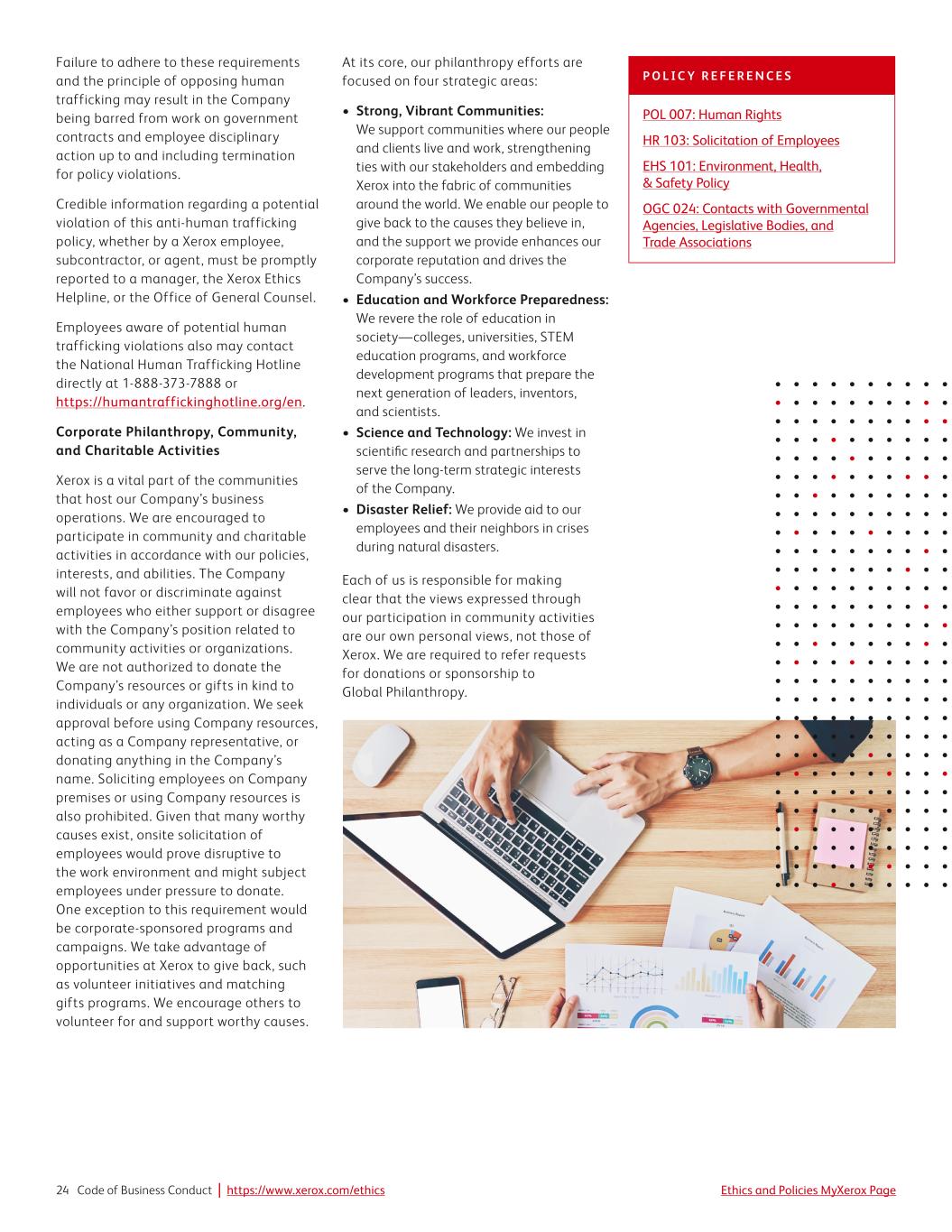
Failure to adhere to these requirements and the principle of opposing human trafficking may result in the Company being barred from work on government contracts and employee disciplinary action up to and including termination for policy violations. Credible information regarding a potential violation of this anti-human trafficking policy, whether by a Xerox employee, subcontractor, or agent, must be promptly reported to a manager, the Xerox Ethics Helpline, or the Office of General Counsel. Employees aware of potential human trafficking violations also may contact the National Human Trafficking Hotline directly at 1-888-373-7888 or https://humantraffickinghotline.org/en. Corporate Philanthropy, Community, and Charitable Activities Xerox is a vital part of the communities that host our Company’s business operations. We are encouraged to participate in community and charitable activities in accordance with our policies, interests, and abilities. The Company will not favor or discriminate against employees who either support or disagree with the Company’s position related to community activities or organizations. We are not authorized to donate the Company’s resources or gifts in kind to individuals or any organization. We seek approval before using Company resources, acting as a Company representative, or donating anything in the Company’s name. Soliciting employees on Company premises or using Company resources is also prohibited. Given that many worthy causes exist, onsite solicitation of employees would prove disruptive to the work environment and might subject employees under pressure to donate. One exception to this requirement would be corporate-sponsored programs and campaigns. We take advantage of opportunities at Xerox to give back, such as volunteer initiatives and matching gifts programs. We encourage others to volunteer for and support worthy causes. P O L I C Y R E F E R E N C E S POL 007: Human Rights HR 103: Solicitation of Employees EHS 101: Environment, Health, & Safety Policy OGC 024: Contacts with Governmental Agencies, Legislative Bodies, and Trade Associations At its core, our philanthropy efforts are focused on four strategic areas: • Strong, Vibrant Communities: We support communities where our people and clients live and work, strengthening ties with our stakeholders and embedding Xerox into the fabric of communities around the world. We enable our people to give back to the causes they believe in, and the support we provide enhances our corporate reputation and drives the Company’s success. • Education and Workforce Preparedness: We revere the role of education in society—colleges, universities, STEM education programs, and workforce development programs that prepare the next generation of leaders, inventors, and scientists. • Science and Technology: We invest in scientific research and partnerships to serve the long-term strategic interests of the Company. • Disaster Relief: We provide aid to our employees and their neighbors in crises during natural disasters. Each of us is responsible for making clear that the views expressed through our participation in community activities are our own personal views, not those of Xerox. We are required to refer requests for donations or sponsorship to Global Philanthropy. 24 Code of Business Conduct | https://www.xerox.com/ethics Ethics and Policies MyXerox Page
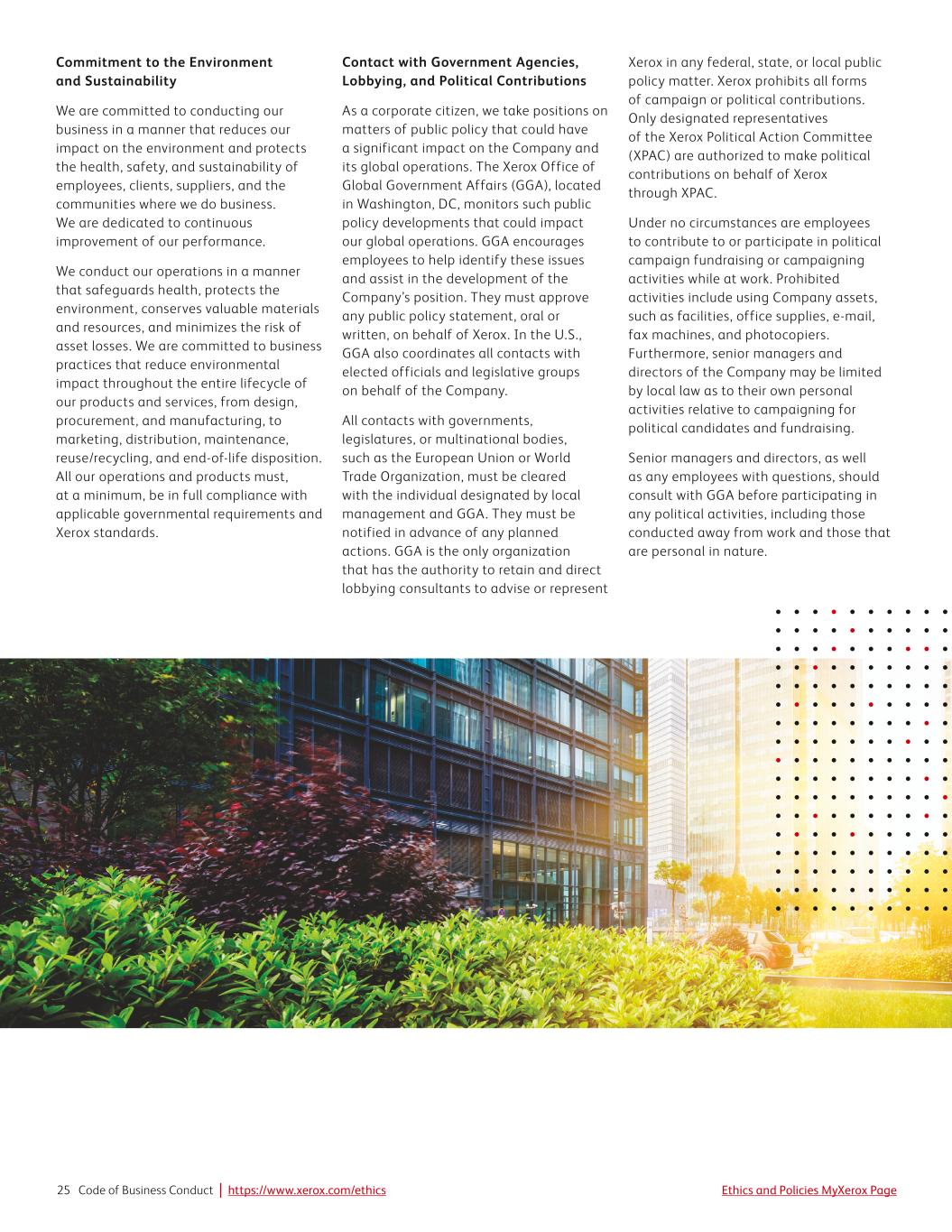
Commitment to the Environment and Sustainability We are committed to conducting our business in a manner that reduces our impact on the environment and protects the health, safety, and sustainability of employees, clients, suppliers, and the communities where we do business. We are dedicated to continuous improvement of our performance. We conduct our operations in a manner that safeguards health, protects the environment, conserves valuable materials and resources, and minimizes the risk of asset losses. We are committed to business practices that reduce environmental impact throughout the entire lifecycle of our products and services, from design, procurement, and manufacturing, to marketing, distribution, maintenance, reuse/recycling, and end-of-life disposition. All our operations and products must, at a minimum, be in full compliance with applicable governmental requirements and Xerox standards. Contact with Government Agencies, Lobbying, and Political Contributions As a corporate citizen, we take positions on matters of public policy that could have a significant impact on the Company and its global operations. The Xerox Office of Global Government Affairs (GGA), located in Washington, DC, monitors such public policy developments that could impact our global operations. GGA encourages employees to help identify these issues and assist in the development of the Company’s position. They must approve any public policy statement, oral or written, on behalf of Xerox. In the U.S., GGA also coordinates all contacts with elected officials and legislative groups on behalf of the Company. All contacts with governments, legislatures, or multinational bodies, such as the European Union or World Trade Organization, must be cleared with the individual designated by local management and GGA. They must be notified in advance of any planned actions. GGA is the only organization that has the authority to retain and direct lobbying consultants to advise or represent 25 Code of Business Conduct | https://www.xerox.com/ethics Ethics and Policies MyXerox Page Xerox in any federal, state, or local public policy matter. Xerox prohibits all forms of campaign or political contributions. Only designated representatives of the Xerox Political Action Committee (XPAC) are authorized to make political contributions on behalf of Xerox through XPAC. Under no circumstances are employees to contribute to or participate in political campaign fundraising or campaigning activities while at work. Prohibited activities include using Company assets, such as facilities, office supplies, e-mail, fax machines, and photocopiers. Furthermore, senior managers and directors of the Company may be limited by local law as to their own personal activities relative to campaigning for political candidates and fundraising. Senior managers and directors, as well as any employees with questions, should consult with GGA before participating in any political activities, including those conducted away from work and those that are personal in nature.

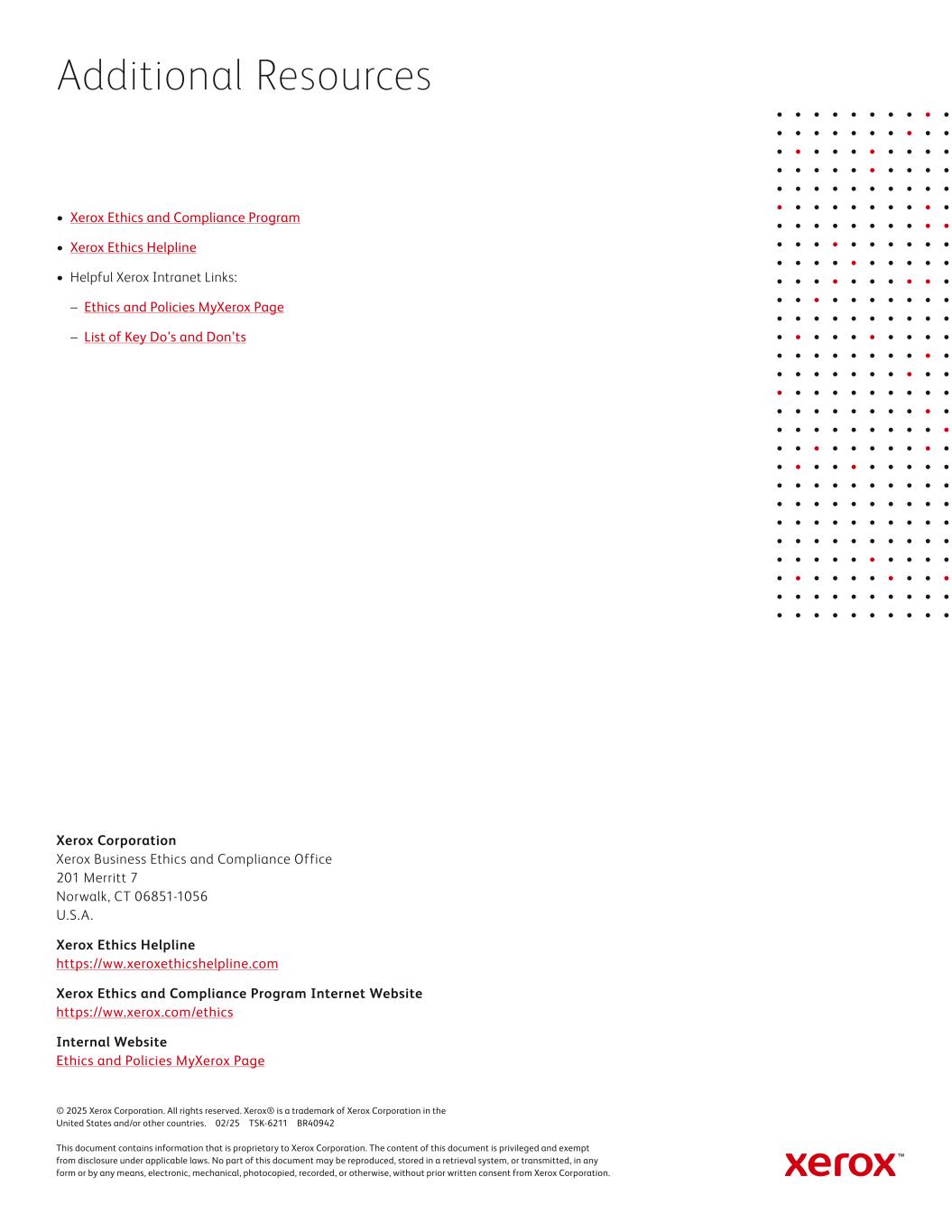
Xerox Corporation Xerox Business Ethics and Compliance Office 201 Merritt 7 Norwalk, CT 06851-1056 U.S.A. Xerox Ethics Helpline https://ww.xeroxethicshelpline.com Xerox Ethics and Compliance Program Internet Website https://ww.xerox.com/ethics Internal Website Ethics and Policies MyXerox Page © 2025 Xerox Corporation. All rights reserved. Xerox® is a trademark of Xerox Corporation in the United States and/or other countries. 02/25 TSK-6211 BR40942 This document contains information that is proprietary to Xerox Corporation. The content of this document is privileged and exempt from disclosure under applicable laws. No part of this document may be reproduced, stored in a retrieval system, or transmitted, in any form or by any means, electronic, mechanical, photocopied, recorded, or otherwise, without prior written consent from Xerox Corporation. • Xerox Ethics and Compliance Program • Xerox Ethics Helpline • Helpful Xerox Intranet Links: – Ethics and Policies MyXerox Page – List of Key Do’s and Don’ts Additional Resources